#to then doing all of that in 1980/1981
Text
thinking about neil recording demos a couple months before he met chris
#i mentioned it today to my mom and now im like oh. hm#i can't exactly articulate it im too tired#just the fact he did that interests me#i wish he'd talk more about his thought process from that time#because yeah he was getting into electronic music and that was quickly becoming apparent to be the next Thing in popular music#hence why he bought a synthesizer#but even tho he spent his redundancy money on it thats still a big investment and commitment#and then to go and record demos professionally at a studio?#idk it just seemed like around that time/before then he kind of became disillusioned that he'd actually get anywhere#to then doing all of that in 1980/1981#i just want some kind of insight in what was going through his head beyond what he kind of says in the preface of his book#he broke up with his girlfriend around then idk if that had anything to do with it. probably not but 🤷♀️
7 notes
·
View notes
Text
I’ve been doing a lot of research on the wizarding world and here are some canon things I have found out that I didn’t know
Molly and Arthur did not go to school with the marauders. They started in 1961.
Gideon and Fabian were between the ages of 31-41 when they died, I thought they were young like James and Lily. Molly is 2 years younger then them.
Bellatrix, Narcissa, and Andromeda all went to school with Molly and Arthur but they were sorted into Slytherin while Molly and Arthur were sorted into Gryffindor.
Bill was born in 1970, Charlie in 1972, Percy in 1976, Fred and George in 1978, Ron in 1980, and Ginny in 1981.
Molly and Arthur didn’t know that they were having a daughter until Ginny was born.
Hermione Granger is the oldest out of the three friends.
Rowling confirmed Dumbledore’s sexuality
Grindelwald and Voldemort weren’t fighting for the same things
Tom Riddle was conceived under a love potion. Some even say that’s why he can’t feel love.
Hermione became minister of magic
James and Lily had Harry at 19/20 years old
Molly and Arthur married right away after Hogwarts not wanting to waste time. They’ve been together for over 50 years (honestly goals) They also had 12 grandchildren. 5 grandsons and 7 granddaughters.
Hermione’s name means messenger.
The original timeline for the original 7 books/8 movies is 1991-1998
Remus Lupin was bitten by Greyback at age 4 (which I knew) but he was bitten because his father, Lyall, said some pretty nasty/hateful comments about werewolves in front of Greyback so he snuck into Remus’s room and attacked him as revenge
#harry potter#ron weasley#bill weasley#charlie weasley#percy weasley#fred weasley#george weasley#ginny weasley#molly weasley#arthur weasley#tom riddle#bellatrix lestrange#narcissa malfoy#andromeda tonks#hogwarts school of witchcraft and wizardry#canon#witchcraft#wizard
160 notes
·
View notes
Note
Do you have any recommendations for gay horror?
*Cheshire cat smile* I do yeah. First off I highly suggest the works of gay film directors who worked in horror: James Whale, Joel Schumacher, Clive Barker, Jane Schoenbrun, Don Mancini, etc. Even if there aren't always explicit gay characters there are queer themes in their films and they are worth examining.
Ok list time:
The Haunting (1963)
The Vampire Lovers (1970)
Shiver of the Vampires (1971)
Daughters of Darkness (1971)
The Velvet Vampire (1971)
The Blood Spattered Bride (1972)
Alucarda (1977)
Cruising (1980)
Butcher, Baker, Nightmare Maker (1981)
The Living Dead Girl (1982)
Tenebre (1982) [The feature film debut of trans actress Eva Robin's]
The Hunger (1983)
Gothic (1986)
Tetsuo: The Iron Man (1989)
Poison (1991)
May (2002)
Hellbent (2004)
Seed of Chucky (2004)
All About Evil (2010)
Chillerama - I Was a Teenage Werebear segment (2011)
All Cheerleaders Die (2013)
Stage Fright (2014)
Good Manners (2017)
Thelma (2017)
Knife + Heart (2018)
What Keeps You Alive (2018)
Bit (2019)
Scream, Queen! My Nightmare on Elm Street (2019) [this is a documentary but I'm gonna count it!]
Saint Maud (2019)
Death Drop Gorgeous (2020)
Titane (2021)
Huesera: The Bone Woman (2022)
As always, horror comes with triggers and some of these do have big homophobia warnings (Butcher, Baker especially).
BONUS:
Shows: Penny Dreadful, Interview With the Vampire, The Exorcist, Dead Ringers, Chucky, Dragula
457 notes
·
View notes
Text








Knock offs, all the way down. I love this stuff, man, it just scratches an itch in my brain in a way that never fails to be entertaining.
So, this is Skull Turret (1982), one of two little plastic towers made to hold the monster figures from Arco’s Dragons n’ Monsters line of rack toys. The other one is Headsgone Tower. Each had one dragon and three monsters, all molded in colored plastic that is so bright it is difficult to photograph. I have the full compliment, save one of the dragons.
The towers are cute, but the monsters are the interesting bit. Old heads might have already noticed, certainly folks who listened to the podcast episode on these guys know: the little dudes are knock-offs of various RPG miniatures. The dragon that I don’t have is Ral Partha’s Royal Dragon, while the one I do have is just the Welsh dragon in plastic. The Cylcops and the Birdman are both very close but not exact replicas of minis from Martian Metals (circa 1979?). The fellow with the whip is a crude copy of Tom Meier’s Troll Discipline Master from Citadel (circa 1981?). The Djinn is from Heritage, as is the “Brawn Hulk,” itself an Umber Hulk from D&D with the serial numbers filed off. Last, and perhaps most recognizable, is the Lizardman With Club from Grenadier’s line of Dungeons & Dragons miniatures from 1980.
I love them!
119 notes
·
View notes
Text
Now and Then
1977
youtube
Now and Then: I know it's true / It's all because of you
And if I make it through / It's all because of you / And now and then / If we must start again / Well, we will know for sure / That I love you
I don't wanna lose you, oh no / Abuse you or confuse you / Oh no, no, sweet darlin' / But if you have to go away / If you have to go, well you the reason [?]
Now and then / I miss you / Oh, now and then / I want you to return to me / 'Til you return to me / I know it's true / It's all because of you / And if you go away / I know you could never stay
.
1978
youtube
Love Awake: Love awake to the day / When we can make our love awake / Lord knows we need it any time we can get it / But we forget it every now and then / But if you don't feel it, later on, you'll regret it / And if we let it we could set it free, you and me
.
1981
youtube
My Old Friend: If I told you how I feel / Oh, it wouldn’t sound so real / ‘Cause emotions, they are just now settin’ in / But it sure is great to know / That wherever we may go / We can always be the best of friends
My old friend, / Thanks for inviting me in / My old friend, / May this goodbye never mean the end / If we never meet again this side of life / In a little while, over yonder, / Where it’s peace and quiet / My old friend, / Won’t you think about me every now and then
.
Well, it was something that I’ll never live long enough to forget. It happened in February of 1981 and as the world all knows, and never will forget, in December of 1980 when John Lennon was taken away from us, and so this was the following year, in February. I wrote the song about and for Paul McCartney. I did it because he was so kind to invite me down to this beautiful island of Montserrat with Stevie Wonder. Ringo was there, just had a wonderful time.
I flew down by myself. Paul and Linda met me with a jeep on the (center) airfield with a little single engine plane and took me across the mountains we were like kids again, and it was a wonderful time, and I wanted to do… I didn’t want to cry when I left after staying down there, and I’m a big crybaby! If something moves me, I’ll just choke up… I talk about it.
I thought that would happen, so the night before, I just wrote how I felt on the isle of Montserrat on every shell, forget a country boy with a guitar and a song you invited me, and you treated me like kin, and you’ve given me a reason to go on. So my old friend, think about me every now and then.
I sang it for Paul, at about 10:00 the next morning. I was scheduled to leave flying again in the little single engine aircraft to the island of Antigua where I was flying commercial back to Atlanta and on to Nashville and back to Jackson, where I live here.
I sang it, he said “Carl, it’s beautiful… would you sing it again?” and I said. “Sure, man.” He said “wait just a minute,” and he got Linda in there, and they sat on the floor, I sat on his old Fender twin reverb amplifier, with a guitar, I did however notice a microphone over there. I didn’t pay that much attention to it, but George Martin recorded it and after I finished singing the song to Paul, he was crying, tears were rolling down his pretty cheeks, and they’re pretty to me just like they are to the rest of the world. I think he’s a very handsome boy and always did. He’s even handsomer when he’s crying.
And Linda said, “Carl, thank you so much.” I said, “Linda, I’m sorry… I didn’t mean to make you cry.” She said, “But he’s crying and he needed to. He hasn’t been able to really break down since that happened to John.” I mean he stepped outside of the room, out by the pool, and he just had his handkerchief out, and he was going at it.
And she put her arm around me and said, “But how did you know?” I said, “Know what, Linda? I don’t know what you’re talking about?” She said “There’s two people in the world that know what John Lennon said to Paul, the last thing he said to him. Me and Paul are the only two that know that, but now there’s three and one of you… you know it. I said, “Girl, you’re freaking me out! I don’t know what you’re talking about!”
She said the last words that John Lennon said to Paul in the hallway of the Dakota building were… he patted him on the shoulder, and said, ‘Think about me every now and then, old friend.’
Q: That’s just amazing…
And she said, here you are, that’s what you just sang, and how did you know? And I said I didn’t know it, gosh, I didn’t know it. But McCartney really feels that Lennon sent me that song, he really does.
— Carl Perkins, interviewed for Goldmine (September 26, 1986).
.
1994
Paul had gone to Yoko to ask if she had any of John’s songs kicking around. The deal was that Paul would induct John into the Rock and Roll Hall of Fame in return. Yoko’s a generous person in that respect, so she actually gave him three songs – 'Free As A Bird' and 'Real Love' were worked up and released, the last one wasn’t.
— Source close to the Anthology project, quoted in the Sunday Express (April 29, 2007).
.
1995
It was one day – one afternoon, really – messing with it. The song had a chorus but is almost totally lacking in verses. We did the backing track, a rough go that we really didn’t finish. It was sort of a bluesy sort of ballad, I suppose, in A minor. It was a very sweet song. I liked it a lot. Should it ever be completed it would probably end up as either ‘Now And Then’ or ‘Miss You’. I wished we could have finished it.
— Jeff Lynne, quoted in the Sunday Express (April 29, 2007).
It didn’t have a very good title, it needed a bit of reworking, but it had a beautiful verse and it had John singing it. [But] George didn’t like it. The Beatles being a democracy, we didn’t do it.
— Paul McCartney, interviewed for Q Magazine (November 2006).
.
2007
There are a couple of things which may surface at some point. You see, with the Beatles, there’s always a surprise somewhere along the line. We did ‘Free As A Bird’ and ‘Real Love’, those two songs of John’s, and that was very exciting, very moving for me and very comfortable having his voice in my headphones in the studio again. And there was a third track, another song we had our eyes on called ‘Now And Then’.
l actually wanted to do it on Anthology 3, but we didn’t all agree. But things change and the thing is that it might not go away. There was only one of us who didn’t want to do it. lt would have meant a lot of hard work, the song would have needed a lot of re-writing and people would have had to be very patient with us. But there are these one or two things lurking in the bushes. The Beatles might just raise their ugly little heads again…
— Paul McCartney, quoted in the Sunday Express (April 29, 2007).
.
2012
And there was another one we started working on, but George went off it. We were like, ‘No George, this is John’. He said, ‘It’s still rubbish’. ‘Ok, then’. So that one is still lingering around. I’m gonna nick it with Jeff and do it. Finish it, one of these days.
— Paul McCartney, interviewed for the “Mr Blue Sky: The Story of Jeff Lynne & ELO” documentary (2012).
.
2018
youtube
Get Enough: It was a time when we walked by the docks / I told you, "I need you all of my life" / And watching the tugs rolling by together / Do you remember? / Do you remember the lights on the shore? / How they reflected the rain on the road? / I believed that you love me alone / It was real / Do you remember? / Now and then I see your face / I've been wanting a lovin’ embrace / I've been looking for love, but it gets me nowhere / Oh, yeah, yeah
Get enough, get enough, get enough of (Your love) (x2) / I can't get enough of / Of you
It was a time we were all full of hope / Saw the future burning bright / As we watched the moon rollin’ out to sea / Do you remember? / But those days are erased from my mind / Yeah, I've left all those old days behind / But still I remember your face forever, forever
.
If I'm going to see a face in a painting, it's highly likely to be his.
— Paul McCartney, interviewed by Diane Sawyer for ABC News (November 2, 2000).
.
2022
And then 'Now and Then’ just kind of languished in a cupboard and we didn’t do anything with it. I kept saying, “You know, maybe we should do something with this, seems a bit—” “Hm, I don’t know…” There wasn’t a great desire to do anything with it. So it hung around for a while. Years! And every so often, I’d kind of go to the cupboard and think, “There’s a new song in there! We should do it! We gotta do it!” But it’d go back in the cupboard.
— Paul McCartney, in BBC Sounds Eras: The Beatles (November 2, 2023).
I got a phone call from Paul saying, “Is it possible to use that [MAL] technology for another project I’ve been thinking about? […] Would it be possible to take John’s vocal and clean it up and get rid of everything else? Because that would allow us to finish this Beatles song.” And absolutely, it didn’t take me more than about a second to get back to him and say, “Of course we can do it!”
— Peter Jackson, in BBC Sounds Eras: The Beatles (November 2, 2023).
.
2023
youtube
Now and Then: I know it’s true / It’s all because of you / And if I make it through / It’s all because of you
And now and then / If we must start again / Well we will know for sure / That I will love you
Now and then / I miss you / Oh now and then / I want you to be there for me / Always to return to me
I know it’s true / It’s all because of you / And if you go away / I know you’ll never stay
Now and then / I miss you / Oh now and then / I want you to be there for me
I know it’s true / It’s all because of you / And if I make it through / It’s all because of you
.
I do feel as though ‘Now and Then’ is a love letter to Paul written by John. I mean, I've never really asked Paul about it, and I'm not sure whether Paul would say, ‘Oh, that's definitely it,' because he wouldn't want to second guess John. But that's the sense I get. And I get the feeling that's why Paul was so determined to finish it.
— Giles Martin, interviewed for PEOPLE magazine (October 26, 2023).
When you say you enjoy 'Now and Then', that’s really nice, because that’s why we do it. We do it so people can listen to stuff and not just hear it. 'Now and Then' sounds like a love song. It sounds like a song that John wrote for Paul, and the other Beatles: “I miss you/ Now and then.”
It sounds like Paul has gone there, which I think he did. You know, no one told Paul to go and do it, and Paul didn’t go, This would be a great exercise for the Red and Blue Album.
He was at home in the studio. He dug on the record and started working on it, because it’s his mate. And he really misses John. I mean, that’s the truth. They broke up, and John died nine years later. It really isn’t very long.
— Giles Martin, interviewed for GRAMMYS (October 26, 2023).
.
When I remember the Beatles, I remember the joy, the talent, the humor, the love. And I think, if people remembered us for that — for those things — I’d be very happy.
— Paul McCartney, in BBC Sounds Eras: The Beatles (November 2, 2023).
#(I just wanted to gather it all in one place)#Now and Then#The Beatles#John Lennon#Paul McCartney#Love Awake#My Old Friend#Get Enough#the person I actually picked as my partner#then you were here today#For you were in my song#Compilation#my stuff#That Paul and John business
244 notes
·
View notes
Text
so... who was going to tell me that my estimates of the tma characters' ages was WAYYY off??
and i know jonny probably meant it to be that way so that there'd be leeway for creative interpretation of the characters and all, but my brain wants them pinned down. so. here's a mini-list/research rant of my favs. presently the list consists of:
Jonathan Sims
Martin Blackwood
Sasha James
Timothy Stoker
Mike Crew !
Oliver Banks
Michael Shelley
Gerard Keay
Three disclaimers –
(i) The TMA timeline is a trainwreck. Many assumptions have been made. At least half of them are probably wrong (especially where University is used as an age marker) and also my maths ability sucks because I haven’t done maths in two years, so where there are glaring issues, so feel free to correct me and I will edit accordingly :’)
(ii) This is by no means definite. See above. Honestly, attempting to decipher them feels like trying to understand the Spiral. But I’m doing it anyway, because as both a fanfic writer and an academic, I want to at least try.
(iii) SPOILER WARNING!! SO MANY SPOILERS! I think the only seaosn that isn't spoiled is maybeeee S5 ???
With that, let's go! [Ages are approximate & as-of 2016 / S1]
Jonathan Sims
Age: 28
Birth year: 1987-1988
There seems to be a general consensus on this one. MAG81 appears to be one of the key clues here – ‘Jon says that he was about 8 during the events of the statement and that it happened a year or two after Leitner's library ended, which was in 1994. So he's born around 1987-88.’ [source: reddit]Of note is the fact that he lied about his age and pretended to be older, which is hilarious, and leads me to believe that he’s the youngest of the Archives crew – or at least, near there.
Martin Blackwood
Age: 28-ish
Birth year: 1988
Has worked for the Institute since at least 2009. He’s lied about having a Master’s in parapsychology, so is likely old enough to feasibly be able to have one. As all institute staff have to at least have a Master’s in something archive-related (iirc), all of them must hence be at least 22/23, assuming the Master’s courses are 1 year long.
Jonny has, however, stated that Martin is either a bit older or a bit younger than Jon, and I’m tempted to believe it’s the former (see above).
Sasha James
Age: 28-34, 30-ish?
Birth year: 1981-1987
There’s like, nothing on Sasha. I’m assuming she’s at least older than Jon, because that might be why he began faking his age. The only possible marker would be that Sasha’s worked in Artefact Storage (for 3 months), Research (for longer, I assume) and long enough in Archives to be considered as Gertrude’s likely successor. So, definitely more qualified, and also older than Jon.
Timothy Stoker
Age: 30-ish
Birth year: 1986?
Tim has a degree in Anthropology from Trinity College (I assume this to be Oxbridge, rather than Ireland or something, since he resides in London), and spent 5 years working at a publishing firm. This puts him at 26 (18+3+5) in 2013 when Danny was taken. As he says he began working for the Institute shortly after, I would assume that this is when he stopped working for the firm. I’ve added a bit of buffer because nobody’s birthdays are given, ever, and also there might have been a bit of time between leaving university and joining the firm and/or leaving the firm and finding the Institute. So – 30.
Okay that’s the core staff, onto my other favs.
Michael 'Mike' Crew
Age: 37-ish
Birth year: ~1979
My #1 avatar! I did a double-take after I worked out his entire timeline, but here’s the highlights: He was a uni student during late 1997-early 1998 when he went looking for Ex Altiora in Lion Books. I’m assuming he was a first year, because generally uni students stay in the sameish area for the whole course and I don’t see him missing out on an opportunity to Leitner-hunt just because the store was in a slightly out-of-the-way part of town. So! This puts his birthdate at around 1979-1980.
Oliver Banks
Age: 28-ish
Birth year: ~1987
Oliver Banks’ timeline during & post-Uni makes NO SENSE. Fortunately, we do know that he moved to London around 2005 to do his undergraduate degree at the London School of Economics. Which puts him at around 18 in 2005, and his birth year can be worked out from there.
Quick rant about Oliver’s timeline: Oliver is working at Barclays by 2007, and he was recruited after graduating. Which means he both began and subsequently completed his undergraduate degree between 2005 and 2007. That’s literally impossible for a standard 3 year course. Plus, by around 2007, he’s been working for nearly a year at Barclays, so he started in 2006… so apparently he began his degree and completed it in under a year, since the academic year starts in September??
Michael Shelley / Michael the Distortion
Age: 31 / 49 / early 50s (but canonically 92 at all points in the timeline)
Birth year: ???
I didn’t do the research on this one, so here’s my source because I don’t think there’s any more I can add.This mess is truly Spiral-worthy, which could have been intended, but also may just be the TMA timeline wonkiness at work. There’s also been some speculation that he was hired at even younger than 18, but equally it’s possible that he was hired older, which puts his age squarely into the [I don’t have a fucking clue] range.
Gerard Keay
Age: technically 32
Birth year: ~1984
Gerry was born in the 80s, and given that the above source states he was in his ‘late teens’ in 2002, this tracks. Making the assumption that he’s 18 in 2002, I’m going to place his birth year at around 1984. However, he died in 2014 (I’m assuming late-2014, given that he had time to encounter Leitner in London & travel a bit with Gertrude before his death) in the USA, putting him at around 30 at the age of his death. Since he’s dead, he doesn’t really age, but he is ‘aware’ enough to be in existential pain so I’m going to go with Descartes on this one and say he’s ‘alive’ enough to continue counting his years of existence.
Poor guy. Doesn’t even get to actually die til August 2017 either.
Part 2 ft. the 4 Grandpas of the Apocalypse here
#character ages#the magnus archives#tma#magnus archives#tma spoilers#jonathan sims#martin blackwood#timothy stoker#tim stoker#sasha james#michael shelley#mike crew#michael crew#gerard keay#gerry keay#oliver banks#michael the distortion#i don't know how to tag i don't use tumblr nearly enough for this#tma research#tma headcanons#tumblr keeps destroying my formatting how do i fix this
151 notes
·
View notes
Text

In 1980 Peter Brown, a former assistant to Brian Epstein who later ran Apple Corps, managed the Beatles and was best man at John Lennon and Yoko Ono’s wedding, started work on the definitive account of the Beatles. With the American author Steven Gaines, he spoke to the three surviving band members alongside wives, girlfriends, managers, friends, hangers-on and everyone else in the Fabs’ universe. The book promised to be the last word in Beatles history. Then in 1983 The Love You Make was published, and all hell broke loose.
“They were furious,” recalls Gaines, 78, still sounding pained at the memory. “Paul and Linda tore the book apart and burned it in the fireplace, page by page. There was an omerta, a code of silence around the Beatles, and they didn’t think anyone would come forward to tell the truth. But Queenie, Brian Epstein’s mother, told us above all else to be honest.”
“Even she didn’t think we would be quite so honest,” adds Brown, 87, his upper-crust English tones still in place after five decades in New York.
Why did The Love You Make, retitled by Beatles fans as The Muck You Rake, incite such strong feelings? The suggestion of an affair between Lennon and Epstein on a holiday to Barcelona in April 1963, only three weeks after the birth of Lennon’s son Julian, had something to do with it, but more significantly it was taken as a betrayal by a trusted insider. Brown and Gaines locked the recordings in a bank vault and never looked at them again — until now.
“Very good question,” Brown says, when I ask why he and Gaines have decided to publish All You Need Is Love, an oral history made up of the interview transcripts from which The Love You Make was drawn. He is speaking from the Manhattan apartment on Central Park West where he has lived since 1971. “When [Peter Jackson’s documentary] Get Back came out, a journalist from The New York Times wanted me to talk. I told him I hadn’t talked about the Beatles since the book was published and suggested he go to someone else. He said, ‘There isn’t anyone else. Paul, Ringo and you are the only ones left.’ And I thought, do I have a responsibility to clear it all up, once and for all?”
After the death of Epstein in 1967, Brown assumed the day-to-day responsibilities of managing the Beatles and Apple Corps. He had on his desk a red telephone whose number was known only to the four Beatles. Unsurprisingly, given his insider status, the interviews make for fascinating reading. Paul McCartney, yet to be asked the same questions about the Beatles thousands of times over, is remarkably unguarded. Asked by Gaines if the other Beatles were anti-Linda, he replies: “I should think so. Like we were anti-Yoko.” On the image the Fabs had for being good boys on tour, he says, “You are kidding,” before going on to reference a notorious incident involving members of Led Zeppelin, a groupie and a mud shark, concluding: “No, not in the least bit celibate. We just didn’t do it with fish.”
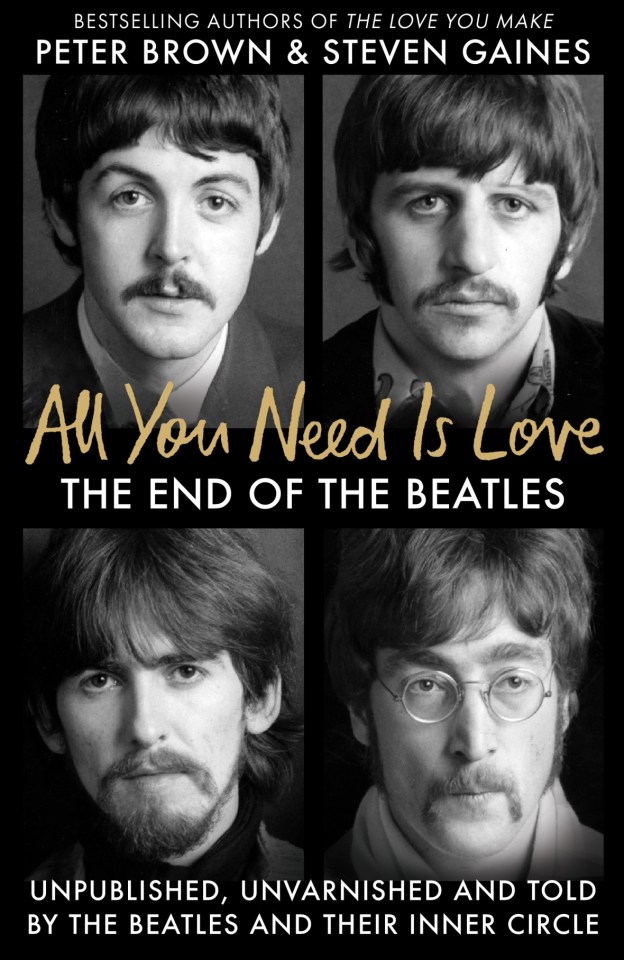
Ono, speaking in the spring of 1981, not long after Lennon was killed in December 1980, reveals that she didn’t sleep with Lennon for the first two years of their relationship — “John didn’t know how to make a move” — and claims that she was blamed by the Beatles camp, George Harrison in particular, for getting Lennon onto heroin in 1969. “Everything we did in those days, anything that was wrong, was my responsibility,” she tells Gaines. But everyone, from the Beatles’ notorious late-period manager Allen Klein to the Greek electronics wizard/hustler “Magic” Alex Mardas — “the Mordred of the Beatles’ Camelot” according to Brown — has their own version of events.
Going through the transcripts reminded Gaines of the long shadow cast by Lennon. “I didn’t realise how sensitive the other Beatles were to John’s opinion,” he says, speaking from his home in the Hamptons, Long Island. “Paul worried about what John would say [in the event Lennon died before being interviewed] and was still longing for his friendship. George said that John didn’t read his autobiography because it was called I, Me, Mine. Those interviews were done before John’s death and Paul’s heart was broken, even then. It wasn’t just the break-up of the Beatles. It was more personal than that.”
From around 1968, the transcripts reveal how the key Beatles duo started to come apart. McCartney’s enthusiasm was only getting stronger. But Lennon grew increasingly bored and disillusioned. “You have to remember that John wasn’t in love with his wife Cynthia,” Gaines says by way of explanation. “He wanted to get away from the life he was leading and that’s why he started to experiment with drugs, all the way up to heroin.”
Brown says Ono was, and probably still is, a distant, mysterious character, exactly the kind of person Lennon was looking for, having done the right thing and married the sensible, quiet Cynthia after she discovered she was pregnant with Julian in 1963. “John told me about meeting this woman, and how frustrated he was that he couldn’t get to know her better; he couldn’t take her to lunch because it would cause gossip. I gave him the key to my apartment so he and Yoko could be together in private and thought, naturally, they were going there to f***. When I went home that evening, the apartment was untouched. They did nothing more than sit on the sofa and talk. That’s what they wanted: to know each other.”
Regarding the long-held, unfair suggestion that Ono broke up the Beatles, Gaines says: “Yoko came along at the right moment to light the fuse, but the dynamite was already packed. They resented her, she was difficult to understand and had a deep effect on John, but they were getting more and more unhappy with each other and needed to have their own lives. As people in the interviews say again and again, [the split] was bound to happen.”
It was Brown who in May 1968 introduced McCartney to Linda Eastman, an ambitious young American photographer whom he knew from his business trips to New York, when she came to London on an assignment to shoot the Rolling Stones. “I was having dinner with Paul at the Bag O’ Nails [a club in Soho] when she turned up, so I introduced them and he was obviously taken with her,” Brown recalls. “The following Friday, May 19, we were holding a party for 12 top photographers at Brian Epstein’s house in London when she walked in. Paul says I didn’t introduce him to his wife … but I did.”
If the book has a villain it is Klein, the New York accountant who took over management of the Beatles and sacked everyone around them, much to McCartney’s horror. As Brown puts it: “He was a hideous person. He even looked like a crook: sloppy and fat, always wearing sneakers and sweatshirts. Everything he didn’t like was ‘for shit’.”
You wonder why Lennon fell for him. “The interviews suggest it is because Allen Klein offered Yoko a million dollars for her movie project,” Gaines says. “She was enticed and John would do anything Yoko said.”
“I asked Mick Jagger to come over and explain to the four Beatles who this Allen Klein was,” Brown remembers. “And John, in his wonderful way, had Klein turn up to the same meeting, which was deeply embarrassing. It made Mick very uncomfortable too.”
Epstein, the man who saw the Beatles’ potential in the first place, is a central figure in All You Need Is Love. It includes a transcript of a recording of him from 1966, not used for the original book. It was in the possession of Epstein’s attorney Nat Weiss, and seemingly made by Epstein to mark the end of the Beatles’ final tour. He claims not only that Lennon felt remorse for the infamous comment on the Beatles being bigger than Jesus — “What upset John more than anything else was that hundreds of people were hurt by that” — but that the Beatles would tour once more. “There’s no reason why they shouldn’t appear in public again,” Epstein claims. They never did, unless you count that rooftop performance on January 30, 1969.
“Brian was driving them around the north of England in his car for a year,” Brown remembers of the early days. “This Jewish guy from Liverpool, who was gay, was with these guys who had been hanging around in Hamburg, so both had interesting backgrounds. They understood each other.”
For Gaines, a self-described “gay Jewish boy from Brooklyn”, Epstein is at the heart of the story. “Brian never felt the love of a real relationship. Then he found the Beatles. Everyone thought it would be just another of his phases, but he had tremendous feelings for John, both sexual and intellectual, and that’s what really pushed him. If there was one thing that started the whole thing off, it was Brian’s love for John Lennon.”
That love affair was the contentious issue of the original book. In his interview, McCartney says of Lennon going to Spain with Epstein: “What was John doing, manipulating this manager of ours? Sucking up to him, going on holiday, becoming his special friend.” It wasn’t the suggestion of a homosexual relationship that was troubling McCartney, but the balance of power tilting in Lennon’s direction.
“Paul wanted to be in charge, and he deserved to be because he was the motor, the driving force,” Gaines says. “Paul felt that John would steal away the power. He felt threatened by John’s relationship with Brian.”
“Paul always wanted to be active,” Brown adds. “After Brian’s death the world had to be carried on. Who was going to do that? It wasn’t going to be John, George or Ringo. Brian was my best friend and I was very upset [at his death]. I had to go to the court to convince the magistrate that it wasn’t a suicide, and the following day Paul set up a meeting so we could discuss what we would do next. I said we’d do it next week, and he said, ‘No, it has to be now.’ He was right.”
How did Brown and Gaines feel about the horrified reaction to the book, not just from fans but the Beatles themselves? “The world has changed,” Gaines says, by way of answer. “Now, after all these years, hopefully people can see it as a truthful, loving and gentle book.” It has been decades since Brown spoke to the surviving Beatles and he has not contacted them about this new publication.
What the interviews really capture in eye-opening detail is the story of four young men who became a phenomenon, then had to deal with the fallout as the dream ended. On December 31, 1970, the day McCartney sued the other three to dissolve the partnership, Brown handed in his resignation as the Beatles’ day-to-day manager and officer of Apple Corps. Ringo Starr said to him: “You didn’t want to be a nursemaid any more, and half the time the babies wouldn’t listen to you anyway.” Brown moved to New York and became chief executive officer of the Robert Stigwood Organisation. But the Beatles never fully left him, and in the wake of Get Back — and the news that Sam Mendes is to direct four biopics, one on each Beatle — he decided he had one last job.
“We have finished our responsibilities,” Brown says with quiet authority. “It is the end of the story.”
EXTRACTS
‘It’s like bloody Julius Caesar, and I’m being stabbed in the back!’
Paul McCartney on the Beatles signing Allen Klein as manager against his wishes
[John Lennon] said, “I’m going with [Allen] Klein, what do you want to do about it?” and I kind of said, “I don’t think I will, that’s my roll.” Then George and Ringo said, “Yeah, we’ll go with John.” Which was their roll. But that was pretty much how it always ended up, the three of them wanted to do stuff, and I was always the fly in the ointment, I was always the one dragging his heels. John used to accuse me of stalling. In fact, there was one classic little meeting when we were recording Abbey Road. It was a Friday evening session, and I was sitting there, and I’d heard a rumour from Neil [Aspinall, road manager] or someone that there was something funny going around. So we got to the session, and Klein came in. To me, he was like a sort of demon that would always haunt my dreams. He got to me. Really, it was like I’d been dreaming of him as a dentist.
Anyway, so at this meeting, everyone said, “You’re going to stall for ever now, we know you, you don’t even want to do it on Monday.” And I said, “Well, so what? It’s not a big deal, it’s our prerogative and it could wait a few more days.” They said, “Oh no, typical of you, all that stalling and what. Got to do it now.” I said, “Well, I’m not going to. I demand at least the weekend. I’ll look at it, and on Monday. This is supposed to be a recording session, after all.” I dug me heels in, and they said, “Right, well, we’re going to vote it.” I said, “No, you’ll never get Ringo to.” I looked at Ringo, and he kind of gave me this sick look like, yeah, I’m going with them. Then I said, “Well, this is like bloody Julius Caesar, and I’m being stabbed in the back!”
‘You don’t like to see a chick in the middle of the team’
Paul McCartney on Yoko Ono
Give Yoko a lot . . . that was basically what John and Yoko wanted, recognition for Yoko. We found her sitting on our amps, and like a football team, an all-male thing, you really don’t like to see a chick in the middle of the team. It’s a disturbing thing, they think it throws them off the game or whatever it was, and these were the reasons that I thought, well, this is crazy, we’re gonna have Yoko in the group next.
Looking at it now, I feel a bit sorry for her because, if only I had been able to understand what the situation was and think, wait a minute, here’s a girl who’s not had enough attention. I can now not make this into a major crisis and just sort of say, “Sure, what harm is she doing on the amps?” I know they would have really loved me. You know, we didn’t like Yoko at first, and people did call her ugly and stuff, and that must be hard for someone who loves someone and is so passionately in love with them, but I still can’t — I’m still trying to see his point of view. What was the point of all that?
They’re very suspicious people [Lennon and Ono], and one of the things that hurt me out of the whole affair, was that we’d come all that way together, and out of either a fault in my character, or out of lack of understanding in their character, I’d still never managed to impress upon them that I wasn’t trying to screw them. I don’t think that I have to this day.
How Cynthia Lennon was driven to drink — at an ashram
Alexis ‘Magic Alex’ Mardas on Ono’s love letters to Lennon
Alexis Mardas was also known as Magic Alex, a name John bestowed on him because he was so taken with Alex’s inventions. Alex was handsome, charming, and a charlatan. (He sued The [New York] Times in Britain for calling him a charlatan and settled out of court. He’s dead now.)
[The Maharishi] was fooling around with several American girls. The Maharishi was making all of us eat vegetarian food, very poorly cooked, but he was eating chicken. No alcohol was allowed in the camp. I had to smuggle alcohol in because Cynthia wanted to drink. Cynthia was very depressed. John was receiving letters from Yoko Ono. Yoko was planning to win John. She was writing very poetic and very romantic letters. I remember those letters because John was coming to me with the letters, and Yoko was saying to John that “I’m a cloud in the sky, and, when you read this letter, turn your head and look in the sky, and if you see a small cloud, this is Yoko. Away from you but watching you.”
Poor Cynthia was prepared to do absolutely everything to win John. She was not even allowed to visit the house where John was staying. She was longing for a drink. Now, drinks, they were strictly prohibited in the ashram, but when it was discovered that Maharishi had a drink, I said, “Just a second, at least equal.”
‘He’s become so nasty’
George Harrison on reaching out to John Lennon
What’s wrong with John, he’s become so nasty. It sounds like he hasn’t moved an inch from where he was five or six years ago. I sent Ringo, John, and Paul all a copy of my book. I got a call from Paul. He called me up just to say how much he liked it. I shouldn’t have called it I Me Mine, because that title was a bit much. I sent a copy to John. I’m wondering if he’s actually received it, if he’s received it, he probably doesn’t like it or something offends him about it.
‘I told John that ... it was just a nice feeling’
Yoko Ono advising John Lennon how to take heroin
George said I put John on H, and it wasn’t true at all. I mean, John wouldn’t take anything unless he wanted to do it. When I went to Paris [before I met John], I just had a sniff of it and it was a beautiful feeling. Because the amount was small, I didn’t even get sick. It was just a nice feeling. So I told John that. When you take it properly — properly is not the right word — but when you really snort it, then you get sick right away if you’re not used to it. So I think maybe because I said it wasn’t a bad experience, maybe that had something to do with it, I don’t know. But I mean so, he kept saying, “Tell me how it was?” Why was he asking? That was sort of a preliminary because he wanted to take it, that’s why he was asking. And that’s how we did it. We never injected. Never.
‘It was time’
Ringo Starr on the end of the Beatles
Ringo Starr: Well, I’m pleased it happened because in so many ways, I’m glad it’s not going now. It was time. Things last only so long.
Steven Gaines: The Rolling Stones are [still] going.
Ringo Starr: Yeah, but they’re old men.
(source)
143 notes
·
View notes
Text

⠀⠀⠀𝐏𝐋𝐎𝐓𝐒 𝐈𝐍𝐒𝐏𝐈𝐑𝐄𝐃 𝐁𝐘 𝐀𝐁𝐁𝐀 𝐒𝐎𝐍𝐆𝐒. ♡
Below you’ll find five plots created inspired by the songs of the swedish group ABBA. These can be used in romantic plots, but also adapted for other types of narrative.
ONE OF US. ( 1981, The Visitors )
Muse a and muse b had a relationship for a few years, but broke up for having very opposite visions of life. Muse a is an artist, sees the world in color and dreams of knowing more about everything, being an enthusiast of all things creative and artistic. Meanwhile, muse b is a businessperson who comes from a traditional family and has always dreamed of becoming the best in their field and living a peaceful life. A few years after breaking up, they meet again, having achieved some of their dreams. Muse a is a recognized artist, travels the world and can live life according to their own wishes, while muse b has achieved a high position in a global company, is recognized and lectures on business and how to achieve objectives. However, they both feel there is something missing in their lives and cannot feel truly fulfilled. The reunion therefore causes mixed feelings, mainly fights about the past, about how muse a cried for months or how muse b felt too small and useless. But something inside them still shines through and maybe there's still a chance. Or will someone get hurt in this story once again?
WHY DID IT HAVE TO BE ME? ( 1976, Arrival )
In a charming seaside village lives muse a, a talented young violinist whose passion for music sets them apart from the rest. Cheerful as ever, their contagious joy and love of life has always attracted curious eyes, especially those of muse b, an introspective painter who finds beauty in the little things. Their lives take an unexpected turn when a summer festival is announced in the town, promising a talent contest. Muse a and muse b end up getting involved in the planning of the contest, causing them to suddenly grow closer and start spending a lot of time together, whether naturally or not. Because muse a is very authentic and distracted, they get into a lot of trouble to make the contest happen, which forces muse b out of their comfort zone. Feelings begin to emerge naturally, making them think "Why did it have to be me?" and deciding, unaware of the other's decision, to perform in the show as a way of expressing their feelings.
MONEY, MONEY, MONEY. ( 1976, Arrival )
In the busy alleys of a bustling city, muse a is trapped in a routine of debt and financial difficulties. Working tirelessly at a job that barely pays the bills, they dream of a life of luxury and comfort. In a twist of fate, muse a meets muse b, a charismatic businessperson who has always lived in a world where money has never been a problem. When they notice muse a's situation, muse b decides to hide their lifestyle for fear of being attracted to them for that reason alone. Muse a begins to get closer to muse b, having someone to talk to who seems to understand everything. However, muse b's lies start to cause a lot of confusion for both of them and they have to choose whether they really want muse a to live in a lie forever or to tell the truth.
LAY ALL YOUR LOVE ON ME. ( 1980, Supertrouper )
In the picturesque setting of a coastal island lives muse a, a lonely sculptor whose heart was closed after a traumatic relationship. Everything changes when they meet muse b, a mysterious person who arrives on the island in search of a fresh start. As they grow closer, muse a discovers the painful secrets that muse b hides, making their time together a way to begin to heal past wounds. Discovering they've both been through toxic relationships and a series of betrayals, muse a and muse b contemplate the possibility of love no longer existing and have to deal with this situation. But when muse b's former partner turns up on the island looking for reconciliation, muse a realizes that their hearts are no longer closed to love. They're completely won over by muse b and will do whatever to have them.
WATERLOO. ( 1974, Waterloo )
Muse a is a determined and charismatic person who works as a tour guide in a historic town. Their lives change when they meet muse b, a charming and enigmatic historian. Their attraction is immediate, but they soon discover sharing a rivalry in the search for information about an ancient secret of the city. As muse a and muse b compete to unravel the centuries-old mystery in an almost real war of espionage and tactics, they discover how they'll need to combine the information they've collected individually if they really want to uncover the secret. As time goes by, they discover more in common than previously thought, find it much easier to work together and start to having a lot of fun with everything discovering more of the town and themselfs.

284 notes
·
View notes
Text
The Big AIDS Metaphor Post
In her essay "Why Are Americans Afraid of Dragons?" from her book The Language of the Night: Essays of Fantasy and Science Fiction, science-fiction and fantasy writer Ursula K. Le Guin writes—
"The use of imaginative fiction is to deepen your understanding of your world, of your fellow men, and your own feelings, and your destiny."
It would be easy for me to claim that Stranger Things is a show that utilizes its science-fiction elements as an AIDS metaphor, but that only goes so far without being able to prove that the show is in fact employing said metaphor. "The show takes place in the 80's -> AIDS was a big part of the 80's -> therefore the show is about AIDS" isn't an airtight argument in itself. I can quote famous sci-fi writers all day but that still wouldn't prove that the Duffers themselves are actually following similar trains of thought.
So here's my big long post about why the show is utilizing it's science-fiction elements as an AIDS metaphor.
Lengthy discussion of rape, violent homophobia and drug use below the cut.
A Brief History of HIV/AIDS in America
For those not in the know about HIV/AIDS, and in order to all get on the same page, here is a short recap. For my information, I will be this timeline from hiv.gov as well as this timeline created by History Channel, as well as some of the supplemental hyperlinks provided. Any other sources I use will be linked throughout.
HIV, or human immunodeficiency virus is a virus that attacks the body's immune system, making it highly susceptible to infection and cancers. The virus can progress to a more severe version of the infection, acquired immunodeficiency syndrome or AIDS. The virus spreads through bodily fluids such as semen and blood. The most common ways for HIV/AIDS to spread was through unprotected sex and sharing needles while using drugs.
The initial cases of HIV were present in America in the 70's but become much more rampant starting in the early 1980s. Because cases of AIDS were most commonly seen in gay and bisexual men, there was a large misconception that AIDS was a "gay plague" or a "gay disease" as it was nicknamed. By 1984, 3,500 Americans had died from AIDS related illnesses.
The reason that AIDS epidemic got as deadly as it did is often attributed to the Reagan Administration's failure to act, something that President Reagan denied. Reagan would not publicly acknowledge AIDS until 1985, despite U.S. health officials being aware of AIDS since 1981.
Understanding just how entrenched this metaphor is in the story will include going through each season and examining in detail how each one plays into this metaphor.
Season One: Establishing Metaphor & Government Cover Up in Early Years of Epidemic
The AIDS metaphor is most closely connected with Will's storyline, although it's not exclusive to Will nor is his storyline exclusive to AIDS. Furthermore, the supernatural elements of this show are multifaceted. AIDS is but just one of the metaphors expressed in the show, but for the sake of this post it's what I will be focusing on.
The setup begins following Will's disappearance in episode 1, when Joyce introduces Will's queer coding to us.
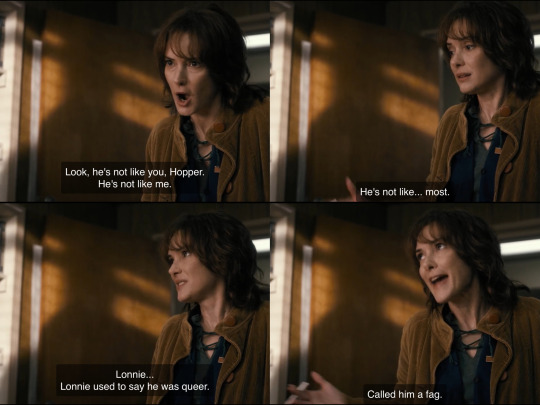
By 1983 the terms "gay disease" and "gay cancer" had been in the public vocabulary for a couple years now. So when Joyce brings up his queerness in regards to to his disappearance in a show that takes place in the early 1980s, there is a subconscious correlation that can be made in the watchers mind. His sexuality is significant to the why he went missing, otherwise why bring it up?
We then hear through Troy exactly what the town believes happened to Will.
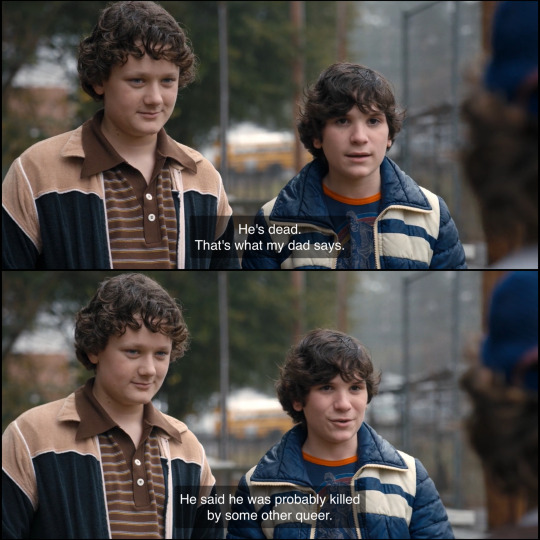
I think that Troy essentially being a mouthpiece for his father is significant to show that Troy's beliefs are not exclusive to him and they do not exist in a vacuum. Troy's homophobia is a product of his environment, which includes his home and by extension, Hawkins.
The specification that Will was killed by "some other queer" adds another layer under the surface of Troy's statement, one that implies that Will was raped before he was kill, otherwise, again, why bring up sexuality in the first place? This was the attitude toward gay men— they rape and kill little boys.
In early 1984, there was a study conducted by the American Journal of Medicine to trace the sexual partners of a cluster of patients with Kaposi Sarcoma, one of the common cancers that killed AIDS patients. The study identified a flight attendant as "Patient O" who was among the first to exhibit symptoms of HIV/AIDS and had a rather active sex life with a multitude of sexual partners. The study was soon misconstrued by the public to claim that there was a Patient Zero who was "a promiscuous or even malicious gay man who single-handedly and knowingly touched off the AIDS pandemic in the United States."
Another crucial factor of the metaphor is the cover-up and blame shifting from the government lab, the exact thing that allowed the problem to escalate and become as deadly as it did to begin with. In the early years of the epidemic, Reagan slashed the budget of public health agencies like the CDC, and it would be years until he ever made a speech about it let alone even mentioned AIDS publicly.
We see how adamant the lab is to cover up any supernatural involvement with Will's disappearance in an attempt to cover their own asses. Framing his death as an accident was their call, all while being acutely aware of what the actual problem was. This confrontation from Joyce to Brenner puts it pretty aptly.
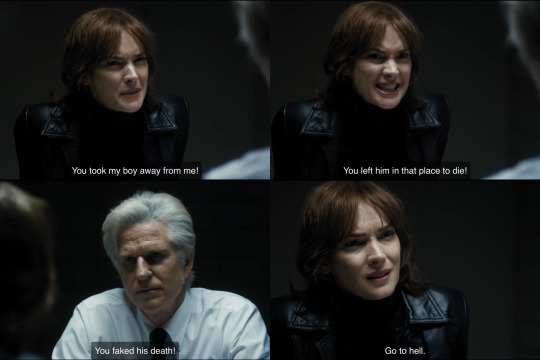
Tangent About Barb
This AIDS metaphor is something that I thought of when I first watched the show back in 2016 (humble brag) but what tipped me off the most wasn't Will or the lab but it was the fact that Barb was the other victim shown.
Barb's queer coding was clear to everyone and their mother. Hell, there's even a joke about it in the Bad Lip Reading of the first season. Barb, Nancy's short haired female friend who takes issue with Nancy's new relationship and has a hard time fitting in with with all of the heterosexual antics of Steve's house party. She's singled out, and while the rest of the gang get to casually enjoy the pleasures of sex, while Barb, another member of the queer community, sadly loses her life. The show cuts between Nancy having sex with Steve with Barb being killed to emphasize this stark contrast.

Season Two: Personal Effects of HIV/AIDS & Social Stigmatization
Season one was surrounding Will while not really showing us much of his pov, but season two dives right in to his perspective.
So, remember when I talked earlier about how Troy, and by extension the town, believed that Will was raped? Well, he wasn't exactly wrong.

This moment wasn't lost on me when I originally watched the show, although I think I ignored the implications because I didn't want to believe what I was seeing. But it's pretty well spelled out— A long, tentacle-like organ used for the sake of reproduction (Will "births" D'Art as a result of this), is inserted inside of Will's mouth without consent.
It's been a year, and Will is still dealing with the trauma of what happened, along with all of these new changes to his life. Will frequently attends doctors appointments at the lab, where the lab themselves aren't completely confident what is happening with him either.
When cases of HIV/AIDS were first appearing in the U.S., health officials were unclear as to what exactly this virus was and how it worked, only that clusters of otherwise healthy gay men were suddenly developing rare and aggressive infections and cancers.
Owens refers to the spread of the Upside Down very clinically— describing it as some cancer. One of the first articles published about HIV/AIDS in America before more information was known was a New York Times article titled "Rare Cancer Seen in 41 Homosexuals." The cancer the headline refers to being Karposi Sarcoma, the rare skin cancer developing due to their weakened immune system.

HIV/AIDS in itself isn’t the disease that patients die from, but instead the weakened immune system allows for diseases to take over the body without much defense. After his visit to the Upside Down, Will faces a series of “True Sight” visions as Mike puts it, which allows for a destructive foreign entity to invade Will's body and slowly take it over.
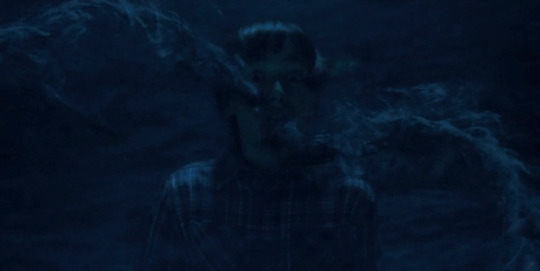
HIV.gov lists the following as some of the symptoms of AIDS:
"Rapid weight loss"
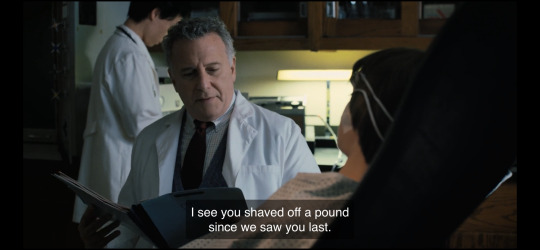
"Profuse night sweats"

and "Memory loss"

To the government agents in the lab, we see just how disposable Will is to them. In their words, if it kills him, it kills him. (thank you to @emblazons for being the one to point this out to me)
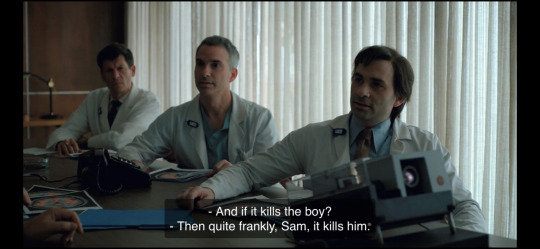
Owens may have held more concern for Will, but he still continues the government cover-up started by Brenner in season one. We also see the fallout of Barb's death, with Nancy and Jonathan fighting to uncover and reveal the truth. Owens is the one who tries to put a stop to their exposé of events to Barb's mom.

Not only is Will facing trauma and his body being ravaged by this new illness, but he's also facing social stigmatization, something common among gay men with positive HIV statuses at this time. There seemed to be some sympathy from the townsfolk when Will was missing and presumed dead, yet he faces animosity almost seemingly because he came back.
The "Zombie Boy" Nickname
I once made a whole separate post about this, but Will's "Zombie Boy" nickname from season two fits in with this AIDS metaphor.
On a surface level, the nickname is in reference to the fact that Will seemed to come back to life despite having a funeral and being buried. In a literal sense, however, his peers are quite literally referring to him a walking corpse that spreads disease. Individuals suffering from AIDS often have very short life expectancies, and zombies are the re-animated dead that aim to infect and kill as many people as possible. It is a very coded nickname.
In the post that I linked, I speculate the possibility that some people in town may even believe that Will has HIV. Remember earlier when I mentioned Troy's comment "he was probably killed by some other queer" which implies a belief that Will was raped. The town don't know about any of the supernatural goings-on, but they do know that Will went missing, was found in a cabin a week later, was hospitalized shortly after and attended frequent doctor visits through the following year. I don't see a reason that malicious rumors would cease, especially considering that they already continue to be cruel and ostracizing with the Zombie Boy nickname.
Look also at this moment of Will getting weird looks as he is being pulled from school to attend his doctors appointment. Why so much stigma around simply going to the doctor?
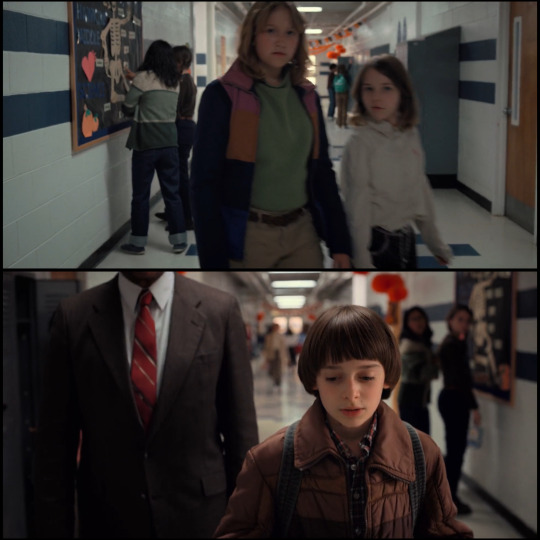
The 1984 Reelection of Ronald Reagan
In 1984, Ronald Reagan won reelection in one of the biggest election wins in history. And— subsequently continuing his and the governments silence towards the AIDS epidemic.

Season two takes place in the week leading up to the reelection. There are small set pieces that draw attention to this, such as this election sign in front of the library.
If the date November 6th sounds familiar, it should.
Dr. Owens mentions the anniversary of Will's disappearance. The one year anniversary of Will's disappearance is the same day that Ronald Reagan was reelected. Will's trauma is being purposefully associated with that day.
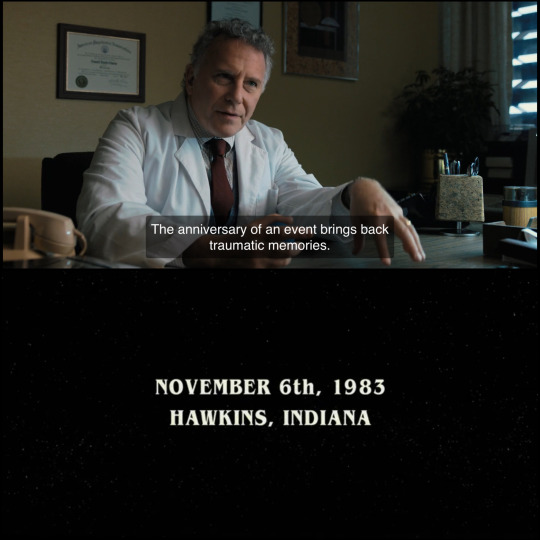
I've also made a separate post before just about the Reagan/Bush '84 signs that litter the lawns of Hawkins houses. They appear most notably in the Halloween episode, building to when Will has his true sight episode that night. There is one clearly in frame just before Will is separated from the group, called a "Zombie Boy" and a "freak" (two very coded nicknames) before he falls into his vision.
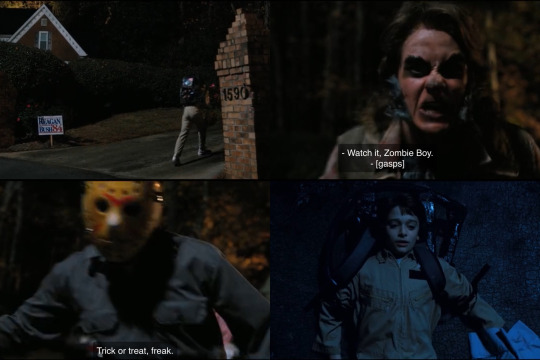
We also get a clear view of the Reagan/Bush sign outside of the Wheeler house before Will describes his experience to Mike.
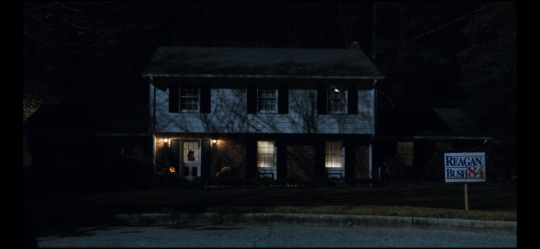
A Tangent About the Wheelers
And now the question on everyone's mind: Are the Wheeler's homophobic?
Ted and Karen Wheeler are not violent, homophobic bullies. That would be a massive reach. But it would also be a reach to say that they are vocal allies. And maybe that's just what the average middle class family
In the very least, the Wheelers are passively contributing to a system that enables homophobia. To be honest, they are probably just going along with what everyone else is doing. Like I said earlier, Reagan was an incredibly popular candidate for the 1984 reelection. The Wheelers have the privilege of being able to comfortably conform without having to worry about much of the consequences. (I'll talk more about the Wheelers later)
In the episode where Will is possessed by the Mind Flayer, Joyce calls the school and we get an extended shot with Reagan's portrait in the background. The shot begins with the portrait slightly obscured, then the camera dolly's in towards the receptionist with the portrait still in frame. Shortly after this Will is possessed in the field. Here is one of the camera begins the shot and where the camera ends the shot.
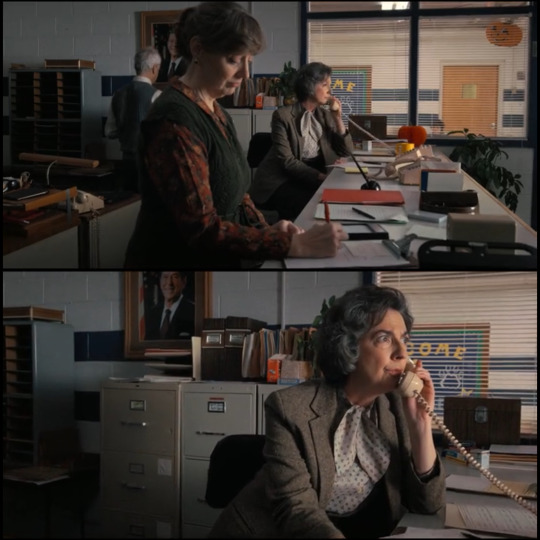
I also wanna note that when Joyce calls in this scene, the receptionist makes a side comment about her and rolls her eyes. There's a clear animosity towards not only Will, but the whole Byers family, including the adults of the town. Including Reagan's portrait in this shot is meant to create a subtle correlation between him and the stigma that the Byers' face.

Season Three: The Façade of Patriotism Over a Dying Nation
It's 1985, Ronald Reagan has been reelected, and this season introduces Hawkins Mayor Larry Kline.

Is Larry Kline meant to be Ronald Reagan?
I would say that Mayor Kline is probably exemplary of American politicians in a broader sense (in fact the Duffers may have been making allusions to Trump with his connection to the Russians) although the fact that he's in office the same time as Reagan is still significant.
In the beginning of the season, Mayor Kline is being met with protesters outside his house, not unlike many of the AIDS awareness protests from the 80's.
The townsfolk are angered with Kline for building the mall and running some of the small businesses into the ground. During Reagan's run, he implemented a system of economics called "Reaganomics," which aimed to cut taxes and support economic growth. Although critics of Reaganomics will point out that his policies had actually increased the wealth gap, making the rich richer and the poor, poor. I want to keep this post about the AIDS metaphor, although I wanted to point this out as it is a connection between Kline and Reagan. And as I said earlier in this post, the metaphors are multifaceted and not just about AIDS.
But continuing, later in the season Kline puts on a big 4th of July festival to celebrate the independence of his country with neon lights and flashy fireworks. Meanwhile, the people of his town are dying right under his political reign.
During season 3, the AIDS metaphor actually moves away from Will, with the focus of his story shifting slowly to romance. This was setup at the Snowball at the end of season 2, and season 3 hints at some of Will's feelings for Mike which will be carried into season 4.
But the metaphor is carried on by Will's name twin, Billy.

Billy and Will sharing the same first name, that being William, feels significant as Will basically passes the baton to him and Billy now becomes the focus for this metaphor. We learn from Max that Billy is very sexually active, and in the beginning of the season he has eyes for Karen Wheeler. It is while he is on his way to this illicit sexual affair when he is "infected" by the Mind Flayer. (this was pointed out to me in the comment of one of my posts, but have since lost it. If you are reading this— thank you.)
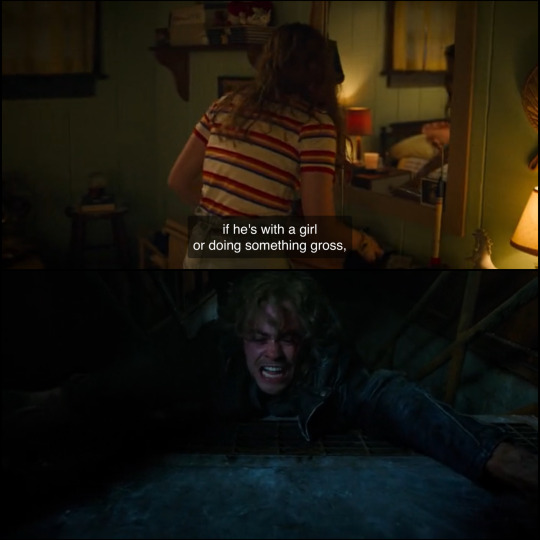
Billy then passes the "infection" along to a girl he was flirtatious with, before the "virus" begins spreading over town.

There is also language and rape imagery associated with being flayed. There is the repeated lines "hold still" and "it'll all be over soon." When Heather's parents are flayed, they are tied up something is forcefully inserted orally, not unlike what we saw with the tentacle inside of Will in season one and his possession in season two. (I first saw this pointed out by @kaypeace21

The flayed begin to eat chemicals, and Nancy makes the comment that Tom, one of the flayed, appears to have been on drugs. Another common way that HIV is spread is through the sharing of drug needles.
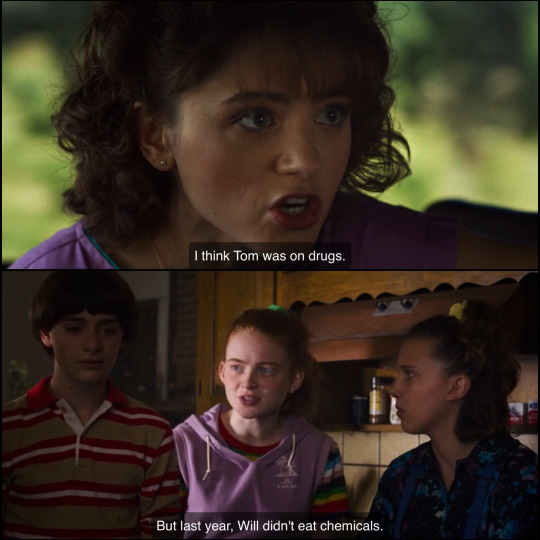
HIV/AIDS in the Press
Nancy's arc with the newspaper this season reminds me a lot of how AIDS was first being reported in the press. Nancy begins her search for a story with stolen fertilizer and diseased rats, not realizing that there was a much bigger and much more dangerous story at hand. One of the first reports HIV in the media was from a CDC Morbidity and Mortality Weekly Report from 1981, which cited five cases of pneumonia in previously healthy gay men in Los Angeles. While still a deadly number, it was relatively small compared to the massive number of AIDS cases and deaths that would soon follow.
When Nancy brings her story to work, Bruce, one of her higher-ups, sips from this rather patriotic coffee mug before telling Nancy to drop the story.

At the end of the 1985 summer in Hawkins, the flayed have died in a "mall fire" and Larry Kline is arrested for colluding with the Russians, and their patriotic façade is shattered.
In September 1985, shortly after actor and close friend of Ronald Reagan, Rock Hudson dies, of an AIDS related illness, Reagan makes his first public acknowledgement of AIDS.
Season Four: Further Stigmatization & LGBT Witch Hunting
In season four the town is finally privy to the fact that there is something wrong going on, although they are unsure of exactly what. When things begin to escalate, instead of blaming the actual guilty party, they go on an all-out witch hunt.
Once again, Will's pretty removed from the AIDS storyline in this season with his arc focusing on his romantic feelings for Mike. With Billy dead and Will out of town, the baton passes once again for the metaphor to be carried by Eddie Munson.
In the first episode of season 4, Eddie is reading a magazine with an article about the Satanic Panic, a real case of wide-spread hysteria in the 1980's regarding the fear of rising Satanism, supposedly promoted by D&D. The article links the game to violent behavior, Satanic worship, sodomy and murder.
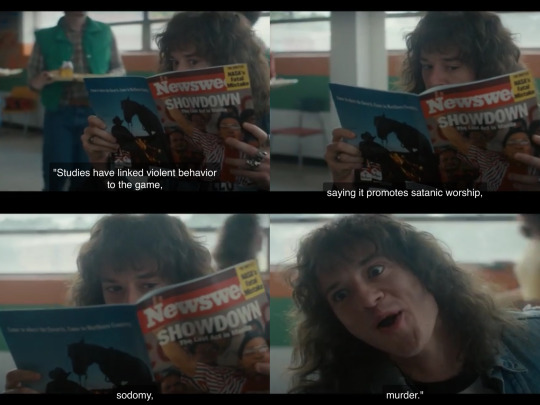
Tangent on Sodomy and Sodomy Laws
Merriam-Webster defines sodomy as "anal or oral copulation with another person." The definition is often expanded to include copulation with animals, although the term sodomy, according to Merriam-Webster, means "especially: anal or oral copulation with a member of the same sex."
While definitions may vary depending on states, some states have specific laws outlawing sodomy, even between consenting adults. In 1986, the Supreme Court upheld Georgia's anti-sodomy laws in Bowers v. Hardwick, after a homosexual man and his partner were arrested after being caught while having sex in his own home. Sodomy laws would eventually be challenged again in 2002 with the Lawrence v. Texas case.
While sodomy can technically can refer to both homosexual and heterosexuals, it is especially and historically has been used in regards to homosexual sex. When Eddie reads the word sodomy here, gay sex is being lumped in and made equivalent to violent behavior, Satanic worship, and murder. Quite literally in season four, Hellfire Club is seen as the evil Satanic sodomizers who bring death to their town.
While trying to find a substitute for the D&D game, one of kids Mike asks mentions 60 Minutes in his rebuttal of Mike's request. This episode takes place on March 21st, 1986. On March 16th, 1986, 60 Minutes played a segment called "Life and Death in San Fransisco," a segment about the AIDS virus on CBS. (EDIT: I originally attributed this to the wrong person, but thank you to @aemiron-main for being the one to point this out. Apologies for my memory mixing up my ST analysts in my head 😔) The archived footage can be viewed on YouTube.
When Chrissy is killed by Vecna inside of Eddie's trailer, leading the town to suspect that Eddie was the killer, she was going there to do drugs. Again, a common way for AIDS to be spread was through the sharing of drug needles. After the town and cops suspect Eddie, the town goes on an all-out witch hunt for him and other members of Hellfire, invoking Christianity as their reasoning. In Eddie's words— "Hunt the freak, right?"
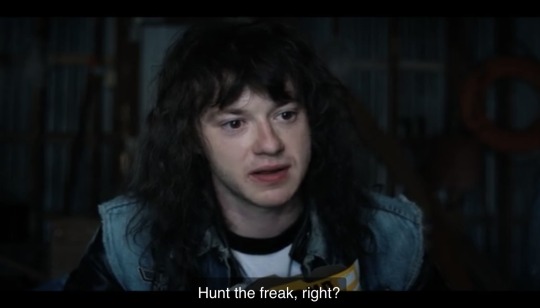
Does this mean that Eddie is queer?
The black handkerchief in his back pocket and Joseph Quinn's flirtatious ad-libs with Steve are not completely lost on me. And the AIDS coding here does seem to be pointing in that direction, but here's what I think.
Eddie's actual sexual orientation, and by extension that of Hellfire, is beside the point and doesn't actually matter in the eyes of the town. Every member of Hellfire could be straight and every member of Hellfire could be gay, but what matters is that Hellfire Club is a group of outsiders that participate in recreational activity that is deemed dangerous, and that in itself is queer, regardless of who they may actually be attracted to.
Another Tangent on The Wheelers
During Jason's religious spiel in town hall which invoked the witch hunt against Eddie and Hellfire, we get this shot of Ted and Karen Wheeler upon remembering that Mike is a part of Hellfire. And boy do they look terrified.
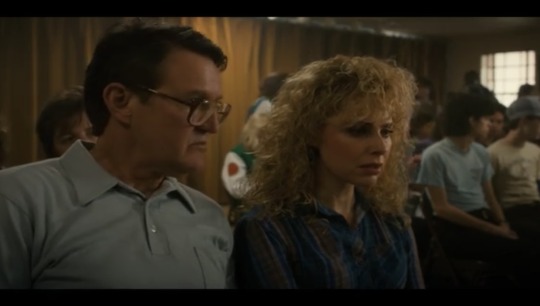
This moment, right here, is what I believe to be the Wheeler rug pull. They may not have been signing up to witch hunt their son when they put that Reagan sign in their front lawn, but this is what it leads to. They're being confronted with the most extreme end of their forced conformity and they fear what they see. I think part of what causes this change in character is because they know Mike, had Mike not been a Hellfire member, who is to say if they would have changed their tune or join in the witch hunt. At the end of the season, when the news reports that the giant gate in town is a "doorway to Hell," both Ted and Karen scoff at the report, calling it "hysteria." The conformists are beginning to un-conform.
Concluding Thoughts & Season Five
Providing a story about HIV/AIDS through a science-fiction metaphor is both practical and ethical. The metaphor allows the show to tell the story to a wide audience without the reliance on outside knowledge. You don't have to be an expert in HIV/AIDS history to understand the story that it's trying to tell. It's ethical as well in that it doesn't force it's incredibly young actors to have to act out being raped and developing HIV/AIDS.
With Eddie Munson dead and Zombie Boy back in town, I think that the AIDS metaphor will shift it's focus back to Will. I think we may see a colliding of the AIDS plot with his romance plot. How do you pursue romance with a HIV+ status? Can you?
The way I see, season 5 has the choice to go in one of two directions:
But first, a short tangent about my uncle
In recent years, I came to learn that my uncle was HIV+, something that wasn't known to me when I was younger. Him and his partner are both in their sixties, and they currently bought a plot of land in which they plan on building their dream house together.
But anyways, the two choices are this:
Will dies by the end of the season. He becomes one of the many gay men with HIV/AIDS who lived a short life, unable to grow into adulthood and pursue his love life. His story is a tragedy.
Will lives. He becomes one of the many gay men with HIV/AIDS who survived and is able to live a long and happy life full of love. His story is an uplifting one full of hope.
Tagging: @emblazons @italiantv @gaysmindpalace @ven0moir @punkwillbyers @mikesbasementbeets @quinterobb @drangues @basiltonpitch @howtobecomeadragon
#stranger things#stranger things analysis#st aids metaphor#tw rape#tw drug use#tw homophobia#okay. after much teasing and putting it off. it is done#if you ever expressed any mild interest in this post then i tagged you#but also apologies if i missed anyone#edit to tags btw i probably did not cover everything just everything i felt most confident on. i know this topic is probably pretty expansiv#if you have additions feel free to add!!
328 notes
·
View notes
Note
are you still doing ur asks abt the ships? if u are what r ur thoughts on wolfstar? if not have a very good day!
thank you very much for the ask anon - and thank you in particular for leading me into danger...
my answer to this is going to be - and wolfstar shippers keep calm please - similar to my jegulus one, which means the tldr is: write what you want, but i’m unlikely to read it, especially if you don’t acknowledge the difference between canon and fanon.
i have no aversion to wolfstar coming up as a background ship (let them be happy while harry/anyone are having drama, i’m all for it) but i generally don’t search out fics in which wolfstar is (one of) the central pairing(s) and tend only to read wolfstar-centric stuff if it’s written or recommended by someone whose opinion i trust.
this isn’t because i think the pairing is unfeasible (the canonical sirius and remus very much have the vibes of people who have enjoyed each other’s bodies…) but because the community which has built up around wolfstar, both among ‘original wolfstar, y’know, like in canon’ fans and their sworn enemies ‘marauders fandom, canon who?’ fans, largely expects certain tropes and characterisations which divorce the characters from what i personally think is interesting about them.
the most egregious of these tropes, in my opinion, is the fact that wolfstar which purports to be canon-compliant or which follows the canon timeline deals so infrequently with the fact that both remus and sirius have such little trust in each other that they believed utterly sincerely that the other was a death eater.
it’s crucial that we understand the profundity of this suspicion and - therefore - what it says about the fragility of the loyalty between them prior to 1980-81. this is not a brief flash of distrust in a high-pressure couple of days at the end of october. the evidence of canon is that we’re talking about a period of months - if not a full year - in which remus and sirius not only think it justifiable to doubt the other’s loyalties, but also seem to be acting on that doubt to try to get the other in trouble.
harry is born in july 1980, at a point when voldemort has all but won the war. severus snape defects to the order at some point relatively soon after this, when voldemort decides that the potters are the family referred to in the prophecy. peter pettigrew then defects to the death eaters in the autumn of 1980 (sirius says in prisoner of azkaban that he was spying for a full year before voldemort’s fall).
snape then evidently tells dumbledore that there is a spy in the order - although he clearly doesn’t, despite a common accusation levelled against him, know this is pettigrew, since the voldemort of the first war has apparently heard of operational security, unlike his resurrected counterpart - and this leads dumbledore to demand a restriction on james and lily’s movements until - by august 1981 (the plausible date of lily’s letter to sirius) - they are basically under house arrest. the implication of canon is that, by this summer at the very latest, james and lily are aware they’re being spied on, from which i think it’s reasonable to infer three things: that dumbledore has begun to suspect that sirius is the spy over the opening half of 1981; that remus, who canonically always trusts dumbledore’s judgements, uses this to confirm his own suspicions about sirius; and that sirius, whose canonical relationship with dumbledore has an undercurrent of unease, especially in order of the phoenix, picks up on this and assumes remus is briefing dumbledore against him. i think it’s also reasonable to infer that the only person convinced there isn’t a spy among his close friends is james.
peter visits the potters’ safe-house and is aware of its address, so we can assume remus and sirius are the same. by october 1981, however, there are clearly concerns that james and lily’s whereabouts are known to the death eaters - perhaps also accompanied by information from snape that voldemort, who loves a bit of symbolism, has selected halloween as the day he will strike - which trigger dumbledore’s advice that they perform the fidelius charm. dumbledore’s unease when james picks sirius as secret keeper is confirmation that he had identified sirius as the spy. that remus is never suggested as a potential candidate is confirmation that sirius believes him to be the spy - and possibly also that james is beginning to think his best friend might be onto something (i always wonder if remus’ bitterness when accusing james of being too trusting in deathly hallows is a flash of self-loathing about the fact that james didn’t trust him). sirius then persuades james to use peter and, within a week of the charm being performed, james and lily are dead, peter has disappeared, and sirius is in azkaban.
[as an aside here, i don’t love the amount of dumbledore bashing in wolfstar, and i think it’s worth doing some dumbledore defence: sirius’ internment in azkaban without trial - a reference to an actual historical event, if you were thinking it sounded far-fetched - is not dumbledore’s fault. the wizengamot acts on dumbledore’s credible belief that sirius was the secret keeper, while sirius - who is cackling his head off the whole time - refuses to speak in his own defence. similarly, dumbledore does not deny sirius access to harry (via hagrid) when he arrives, distraught, in godric’s hollow because he’s contrived a machiavellian plan to keep harry alone and unloved with the dursleys instead of with his true family, but because all the evidence he has available to him is that harry’s life is in danger at sirius’ hands.]
so sirius spends the next twelve years in azkaban, with remus clearly nowhere near his mind. that he stays in prison, and only escapes when he has an unimpeachable chance to get his revenge and protect harry, is because he - like his narrative mirror, snape - is so haunted by his role (indirect, but he canonically thinks that he essentially cast the killing curse himself) in the death of someone he fiercely loved that he considers azkaban a punishment he deserves.
this links to the next issue i have with a lot of wolfstar: that the defining force in both remus and sirius’ lives is james, not each other. the dynamic of the marauders is frequently reduced to the following: wolfstar, who are best friends and lovers it would take the heat-death of the universe to pull apart; james and whatever romantic partner the story wishes to pair him with, who are the same; and peter, who is either there and completely futile, or is replaced with a fanonised female character (dorcas, marlene, alice etc. - none of whom, may i say, it makes sense to have in the same school year as the marauders, dumbledore is not actually running the order as a gang of child soldiers) or a woobiefied death eater (regulus black, barty crouch jr., evan rosier etc.).
but in canon, a different dynamic is clear. james is the lynchpin of the marauders’ world, the anchoring point to all their sense of self; and the moment he is out of the picture no bonds of loyalty remain among the other three. (it’s tempting to think that remus always harbours a belief that sirius is innocent, but i think that this would be less due to an unconditional affection for his friend and more due to the fact that his own self-loathing needs to believe that he couldn’t have stopped james and lily dying; which he should have done if sirius really was the culprit, since he clearly suspected he was a death eater).
if you asked remus, sirius, and peter, clearly each of them would describe james as their best friend (even though james’ eyes are only for sirius - he only has one best man, and harry only has one godfather), but their relationships with each other outside of james are less clearly defined, at least before sirius and remus are the only two left.
this doesn’t prevent pre-1981 (or james lives au) wolfstar - your boyfriend and your best friend being different people is fine, obviously - but it is going to change the dynamic between them in ways i think are significant and which i would like to see explored more, particularly in ways which acknowledge that - for remus and sirius - this dynamic might not lead to the healthiest relationship…
for example, during their schooldays, wolfstar are likely to talk to each other through james, rather than james being surplus to the flirtatious dynamic between them; remus is likely to feel awkward or insecure about the fact that sirius - whose personality is closer to james’ than his - is so happy and gregarious in james’ company; sirius is likely to resent remus’ tendency to stay out of the action, since the fact that he and james mutually encourage each other in their exploits is key to their relationship; remus is likely to resent the fact that sirius is treated by the potters as a second son, while he isn’t, and so on.
during the first war, even if we remove the fact they suspect each other of spying from the equation, they will clash over how to protect james, and remus will undoubtedly take this to mean that sirius cares more for james than for him. during the second war, the long shadow of james - so painful that remus can still barely talk about him, while sirius wants to do nothing but - will hover over everything.
and this leads on to the third reason i generally don’t enjoy wolfstar: that the complicated threads of their canon personalities are removed or reduced to irrelevance to make them fit fanon which has no basis in the books.
now, i’m not going to get into appearance discourse here, although yes, i prefer a tall sirius who tends to wear wizarding clothing and has never heard a single cool piece of muggle music in his life, and i prefer a hollowed and world-weary remus who doesn’t have visible scars. i think background discourse is slightly more important: a great deal of sirius is lost if he is turned into someone who likes being pureblood, who feels more comfortable around his ‘own kind’, or who aspires to sit on the hereditary wizengamot; a great deal of remus is lost if he is turned into someone who didn’t grow up in a loving home with parents who did their best, but whose inability to give him the childhood he really deserved in the face of the prejudice against werewolves in the wizarding world encouraged his absurd gratitude towards anyone who made even a half-hearted effort to act in his interests.
all of my preferred aspects of characterisation are canon-compliant. but deviating from total canon compliance is not a moral failing. the term is more flexible than some of its defenders acknowledge, and people are at perfect liberty to imagine that characters look, identify, or behave differently than they do in the canon narrative without that automatically bringing accusations of writing them out-of-character (after all, it’s clear in the books that both harry and hermione are white, but art and fics which portray them as a different race can still meaningfully be described as canon-compliant if that's an aim they're written to have).
similarly, rejecting canon compliance entirely is just as fine - i think you should indicate to your readers if you’re doing that, but i’m capable of using the back button and moving on with my life if you don’t.
the only hard and fast rule is don’t seek out people who do things differently to you and insult them directly, although i would also suggest that it’s worthwhile to spend a bit of time in introspection about how lots of popular wolfstar and the fandom around it - like the fandom around all slash ships - portrays queerness in ways which are heteronormative (i.e. exclusively equating bottoming with femininity) and portrays women in ways which are misogynistic (i.e. how tonks is often treated in wolfstar discourse).
however, with this said, i think there is a difference between rejecting canon compliance and yet still writing the characters in ways which feel connected in interesting ways to their complex canon selves, and just writing original characters named sirius black and remus lupin.
because i just cannot get on board with a remus who is written as the cleverest one of the four, as assertive and direct instead of avoidant and passive-aggressive, as anything other than incredibly selfish, as anything other than an extreme people-pleaser, as being soft and sensitive (his mild manner hides the fact that he is incredibly cold and calculating - this is a man who is prepared to execute wormtail in front of three children mere minutes after learning he’s still alive), as majorly regretting the snape-versus-werewolf incident (he loves it! snape is terrified of him! he downplays it constantly!), or as functioning as the moral heart of the marauders (when sirius says in order of the phoenix that remus tried to restrain their bullying of snape, he is doing it to make remus - who is incapable of self-criticism - feel better in the face of harry’s anger) when he is in fact quite morally cowardly.
and i cannot get on board with a sirius who is written as a goofy himbo, as a constant flirt and womaniser (more grey-ace sirius, i would like to see it), as the world’s wokest king (a man who’s upset his slave isn’t sufficiently deferential to him isn’t someone who’s going to speak in queer theory buzzwords - this, of course, doesn’t prevent sirius being written as queer, non-binary, trans, femme, and so on, it just means that authors have to deal with the fact that sirius’ way of existing as any of these things will be human, rather than perfect), as a small bean unable to take care of himself (he escapes from prison and swims across the north sea! he charges into danger at the drop of a hat!), as anything other than incandescently loyal to james and harry, as - after james’ death - anything other than completely wrecked by guilt over the fact he caused it, as best friends with his brother and his gang of slytherins, or as lacking the fundamental arrogance and cruelty which make him so interesting.
and wolfstar can work, absolutely, when these things are taken into account. i find the idea of second war remus and sirius, stuck in grimmauld place together, buying harry a joint christmas present, the last survivors in a generation completely hollowed out by loss, incredibly moving. remus' choice to self-destruct in half-blood prince - having lost sirius so soon after having found him again - does, i think, justifiably indicate a change in their relationship during order of the phoenix which can be seen as romantic. i find the idea of first war remus and sirius, each in love with a man they think is a spy, wonderfully bittersweet. i find the idea of school-aged remus pining desperately for a friend who is head-over-heels in love with james to be, quite frankly, canon.
and i also think that two original characters called sirius black and remus lupin can do whatever they want - i’ll just be closing my eyes, pretending i cannot see, and leaving them to it.
201 notes
·
View notes
Note
“Great-great-grandmother Ursula only died last year, and that was after she took a tumble off her broomstick.”
No, actually, it was because one of the idiot beaters had directed a bludger at her head, but Alphard wasn’t going to bring that up.”
I’ve been re-reading this fic after yesterday’s update and it truly is amazing. But my real question is, what’s the story with Great-great-grandmother Ursula. She’s sounds like she’s from almost two generations above Dumbledore and she was still playing Quidditch ? Was she sitting in the stands? What kind of woman was she and how did she die ?
Thank you so much for thé fic it is wonderful and I am so excited for any future updates.
Look, @therealvinelle, praise!
The answer is that secret fic has required @therealvinelle and I to make a hilariously detailed and notated Black family tree in order to keep track both of characters and family scandals. We needed an example of one of the relatives who does last forever (shockingly few of them as JKR had a purge of the entire goddamn family ~1980-1990 that's beautifully hilarious) and we needed a reason for her to have died.
We settled on Great-Great Grandmother Ursula Flint, married to Phineus Nigellus Black (the headmaster guy we see in the books), who we decided lasted until 1981 (good for her!) and so we thought sudden unsuspicious death in the wizarding world, could be a lot of things, eh she gets hit in the head in Quidditch. Which is to say she was most certainly playing.
Great-Great Grandmother Ursula was one of those little old ladies who lived forever and never seemed to run out of energy or the life to go out and do (sometimes inadvisable) things. She was one of those little old ladies who you want to be when you grow up, who just keeps on going even though her husband died sixty years prior, and is out there playing Quidditch with the rest of them. This unfortunately leads to her death when "an idiot beater" hits her not realizing that yes, he is playing against a little old lady and perhaps he should not go all out. She died as she lived. In glory.
#harry potter#the man who would be king#alphard black#ursula flint#meta#vinelle#therealvinelle#praise#emmatk1
62 notes
·
View notes
Text
Today, December 8th, is the day of Jean Sibelius, Finnish national composer, and the day of Finnish music, so I am finally gonna make this post I've been meaning to do for months:
Finnish music Käärijä fans should know.
Basically this is a collection of some music Käärijä refers to in his music. I'm mostly gonna do the songs on Fantastista and Cha Cha Cha Mixtape and the new singles.
Bomfunk MC's
youtube
youtube
Bomfunk MC's Freestyler (Viulunkieli) (1999/2019)
One of the biggest songs in Europe in '99/-00. They made a remake in 2019 that made people mad because the lead character in the music video was now a girl.
They had other hit songs you might have heard if you were alive in the early 2000s. The rapper, Raymond Ebanks, was one of if not the first black people to make Finnish rap.
(Darude Sandstorm 2000)
youtube
(Quick shoutout to fellow Eurovision participant Darude for this actual banger. Yes this is Finnish. The music video was shot in Helsinki)
Frööbelin Palikat
youtube
Frööbelin Palikat- Sutsisatsi satsaa. (1990s-)
Remember when Käärijä bought a shirt of A fan's back during a gig? Yeah, it was a Frööbelin Palikat shirt.
This is a kid's band from the 90s that was a part of all Finnish kids' childhoods. I chose this banger but there are many more.
Känkkäränkkä
youtube
Mikko Alatalo- Känkkäränkkä (1981)
This is the 'känkkäränkkä päivä' Käärijä talks about in Hirttää kiinni.
Anssi Kela
youtube
Anssi Kela 1972.
Kiertävä sirkus and Menestynyt yksilö refer to this song.
Matti Nykänen
youtube
Matti Nykänen Elämä on laiffii (2006)
It's Crazy It's Party.
Fintelligens
youtube
Fintelligens Kaikki Peliin (2003)
Today's new song Toiset Samanlaiset is a feature with Elastinen, one half of Fintelligens. One of the early people seriously making rap in Finnish. Käärijä has said he was a fan of them when he was young. This is a hockey song, so I went with that.
Moottoritie on kuuma
youtube
Pelle Miljoona Moottoritie on kuuma (1980)
Kinda referred to in Kiertävä sirkus but it's a fun song.
Laiva on lastattu
youtube
Huh hah hei starts with 'rakkauden laiva on lastattu' which is a reference to this game of 'ship is loaded with' and you pick a topic and then everyone adds to it. Idk if other people play that game. Anyway someone made a song for the game.
142 notes
·
View notes
Text
@hungarianmudkip69 recently asked @vaspider about the spread of HIV. The excellent discussion there focused largely on qualitative aspects, notably what was going on socially in the 1970s and 80s, HIV's subtlety and long incubation periods, and exponential growth (along with a great refutation of accidental needle sticks as a dominant vector).
I've got a math and physics background - I have some extremely relevant intuition, but I still prefer being able to find real-world numbers to confirm that I haven't misapplied it. I encourage checking out all the links in this post; there's a lot of great information!
We can't literally go back in time and test everyone for HIV, but it is possible to model and estimate, e.g. this 2021 report from the CDC (US-only).
The second graph of figure #2 is very close to what we discussed:

(MMSC is male-to-male sexual contact and IDU is injection drug use; see the article for other details.)
Again, these are estimates, so we can't take the exact numbers as fact, but let's look at the big picture. HIV likely first arrived in the US around 1970; it first gained public attention in 1981, when the CDC reported cases of what we now call AIDS. At that point, the estimate is an order of magnitude of tens of thousands of HIV infections.
The original asker was interested in the behavior of a "patient zero" (see also "Debunking the Myth of Patient Zero", an excellent video linked in that thread). These numbers help us see how little effect one hypothetical person's behavior could have had on the end result. As long as the virus was transmitted at all, it was going to reach the highest-risk populations eventually, and spread once there, whether it took one hop or ten. It was also essentially impossible to notice the pattern and infer the existence of HIV/AIDS in the US until multiple people in the same community developed AIDS and contracted unusual infections - which most likely means that it's reached that high-risk population, and ten years have passed.
Tens of thousands of infections is simply the result of exponential growth during those ten years; stopping it from becoming an epidemic would've required everyone's behavior to have changed. Different behavior, different transmission, different number of hops early on would more likely have changed how long it took to spread widely enough to become noticeable, not whether it did. (An unfortunately familiar concept, in the year 2023.)
The authors also mention that "trend data comparing subpopulations is likely to be robust for each period examined", so let's look back at those individual lines. Injection drug use (IDU) actually was a fairly significant means of transmission by the 1980s, and by the mid-80s, the spread among gay/bi men (MMSC) was beginning to decline. At the end of the decade, IDU may even have passed MMSC. Simultaneously, transmission was still rising among straight people. It shouldn't be too surprising that straight sex became significant; there are rather a lot of straight people!
The CDC also has us covered for a more current picture, as of 2017-2021 in the US:

This does vary greatly by country. Notably, as of 2022 in England, 49% of new diagnoses were among heterosexuals, compared to 45% among gay/bi men. (Do keep in mind that there are far more straight people, so still, a far higher fraction of gay/bi men were diagnosed.)
I personally find that I get the best understanding when I'm able to combine some direct evidence/data with an understanding of the history and social forces; hopefully this piece helps at least one person out in that way!
[Finally, as a footnote: trans women also exist (hi I'm one) and have historically been at high risk. I am unsure to what extent trans women are omitted versus misgendered in the above data. I wanted to focus on historical estimates over time here, and unfortunately wasn't able to find that for trans women, but this review article links to and summarizes some data from two meta-analyses.]
120 notes
·
View notes
Note
Hiiii I have a community question I wanted to ask!!
Abed mentions all sorts of movies and tv shows through out Community, but I just wanted to know if maybe you have like a list of which ones are real and which ones he seemed to like more than others.
I can only think of the dark knight because of the dvd Annie broke, and the Star Wars movies (except he apparently hates the prequels) and cougar town!
great question! sorry for the delay on a response.
so, he mentions/references an insane number of movies and tv shows throughout the series, and I unfortunately do not have a list of every single one. although, I am (VERY slowly) working on an in-depth episode-by-episode analysis of the entire series, and listing every pop culture reference is a subsection in that. but that's not helpful right now. moving on
I don't have the picture, but there's this questionnaire abed filled out (outside of the show, it must have been uploaded to a website as promotional material for the show). he says his favorite movie is a tie between:
ghostbusters (1984, comedy/horror)
an american werewolf in london (1981, horror)
back to the future (1985, sci-fi/comedy)
blade runner (1982, sci-fi/action)
stand by me (1986, adventure/comedy)
stripes (1981, comedy/war)
star wars (1977, sci-fi/fantasy, also called "a new hope")
star wars: the empire strikes back (1980, sci-fi/fantasy)
star wars: the return of the jedi (1983, sci-fi/fantasy)
ferris bueller's day off (1986, comedy/drama)
jaws (1975, thriller/adventure)
raising arizona (1987, comedy/crime)
jurassic park (1993, adventure/sci-fi)
seven (1995, crime/mystery)
the matrix (1999, action/sci-fi)
the goonies (1985, adventure/comedy)
the breakfast club (1985, comedy/romance)
real genius (1985, comedy/sci-fi)
better off dead (1985, comedy/romance)
the fog of war (2003, documentary/war)
pulp fiction (1994, crime/thriller)
(btw if anyone knows what I’m talking about and has the screenshot please rb with it! I cannot for the life of me find it lmao)
I believe this is a list he apparently made in 2009, either in the first few weeks of school or right before the school year started. so it's possible he would answer differently as the series progressed. also, I do take some of these extra-canon things with a grain of salt, as on the same form he said his favorite place on campus was study room D or something, when obviously they definitely meant to write study room F. so, the credibility of my source for this information isn't exactly rock-solid. although, he does mention a lot of these movies on screen, and expresses love for many of them (the most notable ones probably being star wars episodes IV-VI, the breakfast club, and pulp fiction)
as you can see from the list, abed particularly loves american movies from the 80's. just a trend I thought I’d point out.
here's a few others he mentions loving, or just pretty notably references:
the dark night (2008, action/crime, as you mentioned)
rudolph the red-nosed reindeer (1964, musical/animated, is the whole basis of 2x11 abed's uncontrollable christmas)
the shawshank redemption (1994, horror/crime, is the basis for his plot with troy, annie, and shirley in 4x05 cooperative escapism in familial relations)
freaky friday (I believe it's the original one from 1976 specifically, but it's been remade a bunch. comedy/fantasy. it's the basis of abed and troy's story in 4x11 basic human anatomy)
rambo/first blood (series starting in 1982, action/thriller. abed talks about how messy the progressive series titles are in 3x14 pillows and blankets)
ocean's eleven (2001, crime/thriller, the basis for the heist scene from 3x21 the first chang dynasty)
hearts of darkness (1991, documentary/war, abed mentions it while pointedly filming dean pelton's production of his greendale commercial rather than helping with the commercial itself. similarly, hearts of darkness filmed the making of apocalypse now)
apocalypse now (1979, war/action, see the above explanation)
die hard (series starting in 1988, action/thriller, abed mentions wanting to do a die hard homage for christmas multiple times throughout season 4)
good will hunting (1997, thriller/romance, troy and abed's story in 1x24 english as a second language is filled with references to this movie. abed is doing homages on purpose, troy is not)
my dinner with andre (1981, comedy/drama, abed does a very elaborate homage at jeff's accidental expense in 2x19 critical film studies)
indiana jones (raiders of the lost ark, temple of doom, and the last cruscade only. he mentions loving the first three indiana jones movies in 1x04 social psychology)
aliens (1986, action/adventure/sci-fi, he and troy dress up as an alien and ripley in 2x06 epidemiology) (side note, I believe they're specifically referencing aliens, which is a sequel to alien. could be wrong though)
blade (1998, horror/action, they watch it over the course of 3x15 origins of vampire mythology after troy and abed assert multiple times that it is an amazing movie)
I think he generally talks about movies more than he talks about tv shows, but he does mention quite a few of them. some notable mentions are:
friends (1994, sitcom, mentions at least twice)
m*a*s*h (1972, sitcom, mentions in passing in 1x05 advanced criminal law, and references throughout 1x13 investigative journalism)
the cape (2011, action, mentions throughout 4x13 advanced introduction to finality)
who's the boss (1984, sitcom, is the premise of his whole storyline in 2x20 competitive wine tasting)
LOST (2004, sci-fi, mentions at least twice)
obviously there are a LOT more, but I just tried to list some of the most important ones, plot-wise and for understanding of his character. hopefully I’ll be able to get back to everyone with a super long list of every tv show and movie he ever mentions lmao, but that'll take a while. (there are lists online that say they list every movie and tv show abed has ever mentioned, but ngl I don't 100% trust those, so I’ll make my own lmao. but I put the link to one of them if you're curious. here's another one too)
at this point anyone who has seen community knows there are some really really big ones that I haven’t mentioned yet. pieces of media that are INTEGRAL to abed as a character. I was saving them for last lmfao. they are:
kickpuncher
inspector spacetime
cougar town
if I had to pick a holy trinity of media for abed, it would be these three things. these are EASILY the things he talks about the most, which is interesting, as both the kickpuncher movie franchise and the inspector spacetime series are completely fictional, and only exist in the community universe. (this is probably so they can show abed actually watching some of the shows/movies he talks about, without the obvious copyright issues that come with playing clips from an already existing movie/tv show on your screen. they kind of do that with blade in 3x15, but they only play vague fighting sounds, and never show their tv on our screen. anyway. not relevant.) to answer one of your questions from the ask, I believe those two are the ONLY fictional pieces of media abed talks about. as far as I know, everything else he mentions is real, including cougar town.
kickpuncher is obviously reminiscent of sci-fi/action films from the 80's, like robocop. like I said earlier, taking their place so that they could have a more substantial role in abed's on-screen life without any copywrite worries. it's a whole franchise, so there are multiple movies: kickpuncher, kickpuncher 2: codename: punchkicker, kickpuncher 3: the final kickening, kickpuncher: detroit, kickpuncher: miami (?), and kicksplasher (?). kicksplasher is apparently shown as a poster on abed's wall, and I’m assuming it's from the same franchise, although that could be wrong. the point is there's a very elaborate universe for kickpuncher, and it's a big part of abed's, and later troy's, film taste. the first time they mention it is in 1x15 romantic expressionism, when abed, troy, shirley, pierce, and chang all get together in abed's dorm room to make fun of stupid movies together. it's funny that it was introduced as a stupid movie to watch ironically, then troy and abed both end up genuinely loving it lmao. classic
inspector spacetime is obviously reminiscent of doctor who. they're both british sci-fi series that have been running for decades. doctor who uses a police box to travel the multiverse, while doctor who uses a telephone box. doctor who has malicious daleks who chant "exterminate," while inspector spacetime has blorgons who shout "eradicate." the concepts of the shows are obviously the same, with the actor for the doctor changing every season, etc etc. they're essentially the same exact show, but, like I said before, changed slightly so they can world-build without getting copywrited. there is something a little bit silly about this, though. it's definitely a continuity error and it's up to everyone whether they want to accept it as canon or not, I guess, but there's an episode where abed is actually wearing a doctor who t-shirt. (it also references bill and ted, but the doctor who part is what's relevant.) here's some pictures:

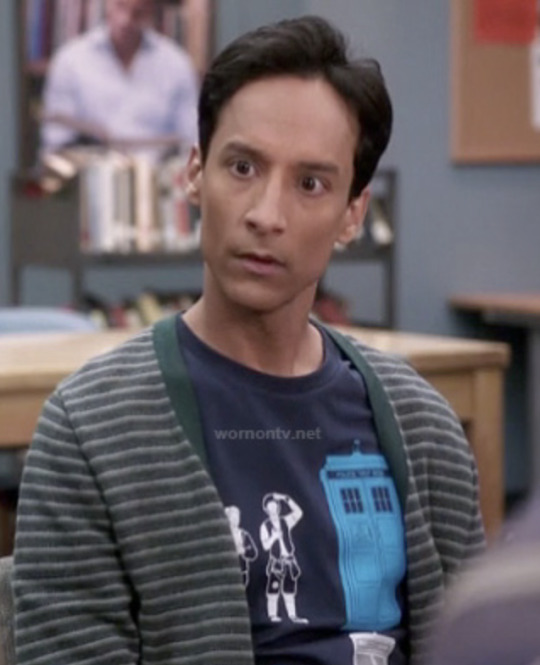
awesome shirt tbh, but it is a little bit funny that is essentially makes it true that doctor who and inspector spacetime both exist in the community universe. and, these pictures are from the cold open of 4x11 basic human anatomy, which is way after inspector spacetime is introduced to the show (3x01 biology 101). so, is inspector spacetime just a rip-off of doctor who? is abed a fan of both shows? if he is, clearly he likes inspector spacetime better. anyway. I would guess that this wasn't intentional. but that is definitely a tardis on that shirt. maybe it's just a classic season 4 continuity mistake. oh well. I guess that's just how the cookie crumbles. anyway.
cougar town time! yes, it's a real show. I didn't think it was but it is. what's not real is cougarton abbey, the short-lived british remake that britta gets abed into in 3x01 biology 101. but yeah. it has 6 seasons and is streaming on hulu, if you're interested. I’ve heard it's not good but who knows for sure. something cool about cougar town is that abed is actually in an episode. let me be clear: not danny pudi. ABED. it's similar to the story abed tells about being invited to the cougar town set and shitting his pants while having an existential crisis about the layers of reality. here is a youtube clip of the scene. I found out about it while stalking danny pudi's wikipedia page months ago, you know, a typical sunday afternoon activity, and I saw a cougar town credit on there. I didn't even know it was a real show at that point so you can imagine my surprise lmao. anyway. idk if you knew that already but it's one of my favorite community easter eggs. so funny.
okay! I hope this is enough information to suit your needs, and I am once again opening the floor to anyone who wants to add anything 💯 this was fun, thanks for the ask, and stay fresh everyone ✌️
#classic sadquickchristmassnowman blunder of writing an entire goddamn essay to answer a simple fucking question#also just to be clear george lucas went back and fucked with the original star wars trilogy#so unless you really put some work in to find the original versions of the original trilogy#you won’t be watching the versions that abed loves the most#sorry my indoctrinated me into his elitist star wars opinions#but I’m keeping it in the tags as to not clutter up the information with more of my senseless yapping#anyway#community#nbc community#community nbc#abed nadir#media analysis#community encyclopedia
81 notes
·
View notes
Text

Among all the many strange and forgotten old RPG things I have come across during the course of this project, I think Gamelords, a Maryland-based publisher that operated from 1980 to about 1984, is my favorite. They’re probably most remembered for publishing Traveller zines by the Keith brothers after FASA stopped supporting the game, but I love their generic fantasy material (and the D&D derivative game Thieves Guild) the best.
This is an early product, The Compleat Tavern (1981), which was published in digest/zine format and includes a cardstock tavern floorplan and some furniture tokens (which seems ambitious for a company of this size at the time and I guess anticipates Tower of Magicks!). It is, as the title suggests, all you need to present a tavern in your game, and more, perhaps even too much (in all seriousness, the page and a half on sex workers is handled OK, especially for the period, but I could still do without it).
The mechanics here remind me of Midkemia’s city books, except applied to a business instead of a city street. There are lots of tables to build clientèle and to move them in and out according to the time of day. There are rules for rates, advice for running the rumor mill, games of chance, a method for charting and running inebriation and a specialized system for bar brawls. Most of these rules are too complex for me to ever consider using them, but I like seeing them and their methodology laid out for me.
The pub games is a welcome addition, even if I don’t need rules for simulating dart matches. I’ve had a lot of groups go to a lot of taverns to move the plot along or to rest, but never for the reasons I’ve gone to a bar — to chat, to hang out, to generally experience some nightlife. I never considered coaxing players into arm wrestling matches or dice games at the tavern, and I might still not for reasons of expediency, but this makes me pause to think about it (and gives me some ideas on how to handle it), and I appreciate that.
85 notes
·
View notes
Note
I actually do tend to put most of the Order we see in the photos around the same years, but my headcanon is that there were other older members but they all died by the time that photo was taken because they were trying to protect the younger kids. I like to imagine that Moody is the only surviving older Order member and he had to watch his peers die one by one and then had to watch as so many of those kids they died trying to protect were killed themselves
Soooo. I can see this working if well justified. There is a line that does justify it in canon, actually- "[...] look, I can’t promise no one’s going to get hurt, nobody can promise that, but we’re much better off than we were last time, you weren’t in the Order then, you don’t understand, last time we were outnumbered twenty to one by the Death Eaters and they were picking us off one by one...”
Voldemort would most likely send his Death Eaters after the best and strongest Order members first, even though they were more likely to take down many of his followers- it's not like he didn't have the numbers. BUT I'm afraid it's a little unrealistic. The weakest fighters in a fight to the death are those who get killed first even with protection.
Just for funsies, though, I'll give you my personal headcanon of the Order members' rough ages. I'm usually flexible if they're changed by a couple of years, but the generations should be kept.
This is the list of confirmed Order of the Phoenix members in the First Wizarding War:
Albus Dumbledore
Aberforth Dumbledore
Alastor Moody
Arabella Figg
Dedalus Diggle
Elphias Doge
Emmeline Vance
Mundungus Fletcher
Rubeus Hagrid
Sturgis Podmore
Severus Snape
Sirius Black
Remus Lupin
Peter Pettigrew (who turns spy for the Death Eaters in 1980)
All these people survive the war. Then we also have:
James Potter
Lily Evans Potter
Fabian Prewett
Gideon Prewett
Frank Longbottom
Alice Longbottom
Edgar Bones
Benji Fenwick
Caradoc Dearborn
Dorcas Meadowes
Marlene McKinnon
Now. The only girl confirmed to be one of Lily's classmates is Mary McDonald and she's not part of the Order (and I choose to believe that she wasn't; she sympathised, maybe, but I like the headcanon that she's so scarred by Mulciber and Avery's bullying - and that the event that Lily references to Severus is not the only time they use Dark Magic on her - that she wants nothing to do with the fight). I am maybe one of the two (2) people with a mild appreciation for BlackKinnon, and I don't mind Marlene as someone in the same age bracket as them (but I can also see her being older). She is murdered along her entire family, though, and it's unclear whether she was a mother, a sister, or a daughter. I will say that some of their Hogwarts years overlapped.
Dorcas I find way less likely. She was killed by Voldemort himself - the man wouldn't have bothered if she wasn't an Amelia Bones-level witch at least, which means she was mighty, which means she most likely wasn't twenty-one. I like to think that she was an Auror, or a Ministry high-ranking employee with sound principles that just would not bend to the infiltration of the DEs in the Ministry or to Barty Crouch Snr's ruthlessness.
Frank and Alice Longbottom are the same, to me. They're older than the Marauders, I would make them (just like Dorcas) around Bellatrix's age, maybe even older. That makes them around 30yrs old in 1981. Which means they would have had a full decade or more to become the most respected Aurors in the Wizarding World, so well known that what happened to them sparked major outrage, the kind that led to a manhunt for their torturers, and the sentencing of a pleading nineteen-year-old boy. (Of course, Barty jr was guilty, but they didn't know that, didn't know just how loyal to Voldemort he truly was. The Lestranges sentencing - an old wizarding family, a Lestrange had even been Minister for Magic - was clearly one sparked by public outrage. People were crying out for their blood.)
The Prewetts were Molly's older brothers, so they were way older than the Marauders. They were also killed by a group of Death Eaters led by Antonin Dolohov after what appears to have been a truly brutal fight, so nope. They weren't the Fred and George types of the Marauders Era (also. the Marauders were that!)
Edgar Bones had a wife and children and was considered to be one of the best of the era, so I doubt he was as young as the Fantastic Four. We really don't know enough about Caradoc Dearborn or Benji Fenwick to say, but I somehow doubt it.
Of those who survived.
We know that Albus, Aberforth, Moody, Elphias Doge, Mundungus, and Arabella Figg are all way older than the Marauders, and I've always pictured Dedalus Diggle as a middle aged man (but we only know he's tiny and excitable, so it could go either way). Sturgis Podmore's description fits someone that could have been in the Marauder's year or maybe slightly older, but still one of their peers.
So, really, the green-faced youths that fought with the Order were: the four Marauders, Lily, maybe Marlene and Emmeline Vance (who isn't even listed as fighting with them in the First War, only the second), and maybe Sturgis Podmore. On the side of the Death Eaters: Avery, Mulciber, Barty Crouch jr (who was two/three years younger than the Marauders!!!), Regulus Black and of course Severus Snape.
And, no. Evan Rosier's age is never disclosed, and since he brutally maims fucking Alastor Moody - possibly the greatest Auror ever - I'm inclined to believe that he was at least Bellatrix's age (so 8-9 years older than the Marauders). In my personal headcanon he's even a tad older - but no less cuntier for it. My boy serves as much cunt at 27 as he did at 17 (<3).
#hp headcanons#hp meta#the marauders#james potter#sirius black#remus lupin#peter pettigrew#lily evans#marlene mckinnon#dorcas meadows#first wizarding war#evan rosier#death eaters#order of the phoenix#god there are so many people to tag i don't know if i can do it#severus snape#asks#answered
56 notes
·
View notes